#obviously can be explored/plotted/built upon
Note
re: about Leon's emotions and feelings towards Ada and vice versa. This is my little attempt to break it down and offer a perspective that evidently not many in this fandom have and here's how: it's been romanticised to hell and back, I wouldn't be surprised if one day the division at Capcom reveals a big "well actually it was never about love between them, but rather a plethora of events that attached them to each other"
Because it can't be about love, it's just too ludicrous. It's not love. It's trauma bond, and like you said it's a sense of comfort and familiarity. But people in our society are too simple minded and once again viewing things through such short sighted romanticised lens to ever be objective about the reality of it. Nothing that Leon and Ada have is written in stone to set some "relationship" to flourish because it's not that, it's a situationship and nothing more.
This is why they resort to trying to use what the devs say and conveniently put words in their mouths to try and justify their biased perspectives. Just because they won't change their dynamic of the usual Ada being one step ahead of Leon and always leaving him in the dark and being a weakness of his, does not mean that it's love. Because it isn't, that's not what they're doing and it's emotionally inept to think so. Because everything they've done has shown the exact opposite. Leon's character was never about Ada and Capcom removing the "romance" from their dynamic isn't what's gonna alter the entire plot, it's the nature of their typical two steps ahead alienation that would wreck it and that's why they'll keep the core of it. But it was never romance.
Hope all this makes sense lol, if you got anything to add, please do :)
"Leon's character was never about Ada"
Everything you said here is 100% correct but I think that specifically stands out a lot, because I think a big issue with hardcore Aeon shippers is that they see Ada as an extension of Leon and vice versa. Like you can't have Leon without Ada, and Leon can never have feelings for anyone else because Ada is such an integral part of his story or whatever. Ada is no more significant to Leon's narrative than Claire or Sherry; the only difference is that he developed feelings for Ada, but having feelings for someone does not equate to love.
I've said this before, but I understand shipping from the perspective of 'these two characters look good together/have a dynamic I like to explore through fanon.' When it extends to taking developer comments out of context to prove canonization of a relationship dynamic that obviously doesn't exist, foregoing common sense and any understanding of nuance? That's touchgrass behavior.
Yes, the only canon longstanding love interest Leon has ever had in the franchise is Ada. This is a fact. However, love is something that is developed over time, and Leon and Ada barely know each other. A loving romantic relationship is not what has been established between them. It's very clear that they both have feelings for one another in the original continuity, but any chance of a normal romantic relationship is ruined by the complexity of their personal situations and moral standing. That's the interesting part about their dynamic, which is literally why they're written that way. That dynamic doesn't even entirely change in the remakes; it's tweaked and built upon, like everything else. Whether or not Leon has feelings for Ada, his story doesn't change, and neither does the foundation of their relationship.
5 notes
·
View notes
Note
You know what Disney movie who’s world building bothers me?
Onward, you have a movie about a fantasy world where magic falls out of style due to technology. Okay that’s interesting but the whole world is just a copy of our world but with elves, Fairies, orcs and stuff and that’s honestly so boring. Their world and history would be so different that their tech would likely be unique to that setting.
I mean honestly I think having a world where there’s a spell that allows you to talk to deceased family members would definitely not have magic be forgotten but gripes like that aside its literally just our world but with a slight fantasy coat of paint.
For example we see a Centaur and he drives a car not a vehicle made for centaurs but just a regular human car that a regular person irl would drive. That’s boring and raises several questions. Would have been much more interesting and fun to design a car built for centaurs like it could motorized horse carriage.
Yeah I really didn’t like watching onward, never even finished that movie it’s world building annoyed me that much so no clue how the plot line with the dad’s walking pants ended (so obviously I’m gonna be missing information)
Especially since most of the magic lore was passed own through….. a DnD parody game of all things, that’s like the only way future generations knew about WW2 was through Cluedo
I think stories like American Dragon or Xiaolin Showdown do a way better job of having magic co exist with modern society ,while without having to go into in deep detail the way onward would have to do it to make its own setting work. In both stories the magic/mystical stuff that goes on in the plot is disconnected from the lives of the majority of people, so unless you’re actively seeking that stuff out or stumble upon it by pure coincidence, the average person in the setting won’t even know magic exists
There isn’t really much of an explanation in Xiaolin Showdown for why the magic conflict isn’t common knowledge ,but there is implications that theres been efforts behind the scenes to ensure it’s self contained. In American Dragon magical creatures have been hunted down by various groups, most prominently the huntsman , so in American Dragon it makes sense for why New York is our world despite having magical creatures in it , because the magic is trying to hide to protect itself
I know someone is going to point out this comparison makes little sense because American Dragon’s magic is hidden while in Onward it’s lost knowledge. But in American dragon mermaids using water tanks and wheel chairs to travel makes sense in the set up that mermaids are in hiding, while in Onward there’s a mermaid deserted on the middle of the lawn in a kiddie pool because…. Why , exactly? How is she gonna get out of that?
Even going with our real world comparison we still have a lot of traditional methods of doing things (like cooking and sewing) despite technology progress. Even if you wanted to make magic out as something difficult and old school, I seriously doubt something that can bring back the dead would only be passed down through a board game if there was no outside factors against it existing
I don’t really like the show anymore but the first three volumes of Rwby actually did this really well. Technically it was Dust and semblances which was not counted as magic (as that was a separate thing apparently) but the set up of people using what’s essentially magic glitter to upgrade their already ridiculous anime logic armoury of “rule of cool,fuck you” to fight each other and monsters is a far more fun and interesting way to explore magic and technology in a setting than “uh, fairies got bored of being able to bend rainbows and forgot to do that in favour of watching the kardashians”
4 notes
·
View notes
Text
The silliness of destroying the Dalek's casing with the microwave parts is pretty on brand for this show and I appreciate it for that reason, and also Ryan's dad jumping into action to suggest it in the first place.
And okay. I will admit, the stupid murder squid possessing Ryan's dad & Ryan having to save him got me teary-eyed. I've reached that point of adulthood where I get emotional over imperfect parents who try making it up to their adult children who realize they never stop needing or wanting them, even despite all the prior disappointment.
I feel like I've got a few apparently several things I want to say about s11 as a whole that I think I'm just gonna tack onto this post ..
So, I made the decision out of nowhere sometime during the past week to start catching up on all the eps I've been putting off from Jodie's era. Might be a misguided attempt to get up to speed for the 60th, but I've honestly done pretty decent enough. Thus far, I've basically finished off all the eps before we get to parts that I know are gonna piss me off. I think if there was any season/series of DW with Jodie that I was ever gonna have the potential to love, it would need to be this one.
I didn't really tho .. love it, that is. Like, I liked it just fine. Overall, I can say it was okay. Not bad by any means, but not giving me the same blood-pumping excitement I used to get from watching DW. I'm not tryna knock on it for no reason, it just didn't quite hit the spot for me like I really hoped it might. There's no one particular reason that I can zero in on as to why.
I feel like I do see some of the criticisms people were making back when it first aired. Namely character-wise. I guess the overarching arc of both the season and the New Year's special was the family conflict between Graham & Ryan along with the grief of Grace's death hanging over them. I really liked certain parts of it, like Grace's 'ghost' haunting Graham in the giant spider episode? I believe? But yeah, that. I kinda wish there'd been more of that during the season, I thought it was gonna connect to the fake mirror!Grace from the frog episode, but I guess not.
But obviously, given that there's so much of a focus on that particular family dynamic, it unfortunately leaves Yaz kinda getting the shaft. Yeah she gets her own whole episode to explore her own background, but the impact it has kind of seems to be contained to that one ep. There honestly could've been some potential for the Doctor to get caught for timey wimey shenanigans happening to her companion's family there. I really thought Umbreen was gonna have a moment to reveal to Yaz that she recognized her as being the same "long lost relative" that showed up on the day of her (first) wedding. We see the rest of her immediate family the next episode, and Yaz's mother is brought along for part of the adventure, so the way they might've reacted to it could've been a fun & interesting thing to get into.
(Also, just for the record, Demons of the Punjab was probably my fave ep of the season and Umbreen Yaz's nani actually means a lot to me; closely followed by Rosa.)
Maybe that's where s11 falls a little short for me. The fact that there are these plot threads just sort of built in but don't seem to get expanded upon. And I could be wrong, maybe some of it does in fact come up in s12 or 13/Flux. And of course, because I am myself, I can't help but see all the places in the story where there was a prominent space-haired shaped hole and how fun that could've been.
I don't really want to delve into it until later whenever I start watching s13/Flux, but the whole exploration of 13 having a potential queer relationship is um, certainly not really given any sort of room to grow in this season, or like exist at all tbh. I obviously refer to the absence of the wife she's literally already gay married to and would have been ready to go, but I'll also briefly touch on my thoughts regarding, well, y'know, the ship that's most popular for 13's era.
People are allowed to ship whatever they want regardless of reason, but nothing about the dynamic in s11 really spoke to me as being particularly indicative of romantic feelings on either side of the equation. And while that's what I'd prefer to an extent, I do think it bears some consideration why the first female iteration of the Doctor is no longer being lusted after by people occasionally, especially the girlies, and that there don't seem to be any/as many instances of kisses or the like that they would receive plenty of back when they presented as a man. Characters falling in love with the Doctor & expressing their attraction has been a staple of the show, technically even since Classic Who when 1 drank hot cocoa & accidentally got engaged. (Even Basil got snogged, if aggressively, by Missy, then proceeded to, much more gently, return the favor. And gazed witheringly at River's lips - yes, it still counts fight me.)
I guess since we are sort of skirting some of the nuances and issues of gender that 13's regeneration brought along, you could say they might've been concerned about depicting what potentially looked like harassment or assault of a female character. Which, I get, but there are ways of doing it without going that far. I'm also aware that people might not have trusted Chibby to be able to depict that well & thus prefer that he kinda just ignored it entirely. At this point, it is what it is, Jodie's no longer the Doctor, so the best I can hope for anyway is her getting to snog her wife in extended universe materials.
I think that's about it for my thoughts on s11. I'mma really have to gird my loins for s12 and the potential (proverbial?) headaches it's gonna cause me. That being said, I still want to see it for myself, if nothing else than to formulate all the ways I'll have to headcanon myself to death to reconcile with the parts of the story I still might vibe with a little.
0 notes
Text
i’m watching kiki’s delivery service which means i want a plot where a young witch flies to a new town on her own and befriends a new person while she figures out her skill.
#tis the season idk just something along those lines#obviously can be explored/plotted/built upon#wanted. / ( plots )
1 note
·
View note
Text
“I’m loyal, that’s my whole thing.” - Scorpia, Season 4 Episode 6, Princess Scorpia
“Everything they taught us in the Horde about loyalty is meaningless” - Lonnie, Season 4 Episode 5, Protocol
Rewatching Season 4, I just finished Princess Scorpia. This is an episode that has always stuck with me, especially the A plot of Scorpia realizing how badly Catra has treated her and everyone else and deciding to leave. One thing I’ve been thinking about since I finished the series, though, is what this episode is telling us on a larger level. Looking beyond the character arcs and more at this show’s larger themes and message. Because this show is very much a show that says things, made by people who believe them. That earnestness and depth is one reason I keep coming back to it.

In the pull-quote above, and throughout the episode and before it, Scorpia defines herself in terms of loyalty. It is her identity - as she says, that’s what Scorpions do, they’re loyal. Her actions for three and a half seasons bear this out. When she first shows up, she tries to position herself as Catra’s new best friend, the one who won’t leave her and will stick by her no matter what. And that’s what she does, until this episode. She sticks by Catra through Catra’s increasingly villainous plots and erratic behavior. But she doesn’t just stick around. Until the portal, she barely contradicts Catra, and even afterwards, does so only furtively and immediately backs away as soon as Catra pushes back. For more than a year of show time, Scorpia has not just stood by Catra, or supported her, she’s actively assisted her in her most villainous and destructive acts. Scorpia is fighting by Catra’s side, eagerly carrying out her orders, and doing her utmost to see that Catra succeeds. But her loyalty goes beyond this practical help. Because for all that Catra loudly declares that she doesn’t need a new best friend, she consistently seeks out connection throughout the show, even when she’s at her most isolated in season 4. She needs moral support, and connection, and to know that she isn’t alone. Scorpia provides that, and keeps Catra going. Though Scropia isn’t initiating Catra’s various misdeeds, she’s assisting and supporting Catra throughout. On a personal, psychological level, the only word that seems adequate for this is ‘ennabling’ - Scorpia, sweet as she is, is Catra’s enabler. We see in the next few episodes what happens when Catra doesn’t have Scorpia’s support - she breaks down, and realizes that her actions really do have consequences, and that the affection she took for granted for so many years is something she can’t live without. But as long as Scorpia’s still around, Catra can’t make that realization.
Now I’m not going to say that Scorpia is morally culpable for Catra’s own actions. She’s not. Catra is solely responsible for her various betrayals, manipulations, violent outbursts and assorted murder attempts against...most of the rest of the cast (though being raised by Shadow Weaver sure as shit is a mitigating factor). But while Catra is obviously being a bad friend to Scorpia throughout, Scorpia isn’t actually being as supportive or helpful to Catra as she thinks, because Catra doesn’t actually need unconditional support, she needs people to be honest with her and express to her how she’s hurting them. She needs people who will stand up for themselves just as she needs to take responsibility for her own actions. This is part of why she and Adora have such a healthy dynamic in season 5 - Adora doesn’t take her crap, and Catra takes responsibility for her crap.
However, Scorpia -is- responsible for her own actions. And as I said above, she’s been with Catra every step of the way as Catra has attacked just about everyone and made war on Etheria. On a larger, political level, Scorpia is a willing participant in upholding the Horde’s oppressive system, and executing a war of aggression and colonization against innocent people. Speaking of colonization, perversely, she’s loyal to the very organization that dispossessed her and literally stole her birthright, then discarded it like a useless trinket when it was no longer useful to them. No one ever suggests ‘why don’t we let Scorpia connect with ~her runestone~’ until Glimmer does (and Glimmer’s motivations and arguments aren’t exactly forthright). Scorpia’s loyalty makes her an accomplice in her own oppression (like a bunch of the themes in this show there’s some interesting post-colonial stuff that the show doesn’t fully explore, probably because Noelle and the crew felt self-conscious about telling a post colonial story, or just didn’t know where to go with it). Interestingly, Scorpia’s loyalty to the Horde here parallels her loyalty to Catra, which has made her completely disregard her own wellbeing, which is the most obvious take away from the episode.
But I would argue that everything above shows that for Scorpia loyalty has been a way of avoiding developing her own moral compass. Scorpia repeatedly shoves aside questions of right or wrong in favor of being loyal to her friends and to the Horde. Loyalty has made Scorpia not only willing to accept her own mistreatment, but to willingly mistreat others, and to keep herself from asking any hard questions about what she’s doing or why. This is despite the fact that Scorpia is, by inclination, an incredibly gentle, kind and compassionate person. She’s willing to silence the best parts of her nature out of loyalty to Catra and the Horde. In the end, she also commits acts of violence and perpetuates the oppression of Etheria. And this is so insightful, because we see this sort of thing in our world all the time. So many oppressive institutions depend upon the loyalty of their members to keep them ‘just following orders’; so many abusive systems depend upon loyalty to stifle dissent and silence potential whistleblowers before they even speak. We see this in some of the most oppressive institutions and the worst scandals in our own society, and looking back through human history we see it in some of our nation’s and our species' most infamous crimes.
And when we look at the Horde as a system that Hordak has built in imitation of his elder brother’s empire, we see just how central loyalty is an ethos. Hordak himself is motivated entirely by loyalty to Prime - being a former clone, he spends the entire series not fully capable of accepting himself as an autonomous being (even when he acts like one and enjoys it, there’s some fucked up religious shit there that I won’t get into). He seems to have instilled this in his followers. The Horde Trio, Catra and Scorpia all hold loyalty as one of their highest values. Catra clings to it as her biggest accusation against Adora - that she was disloyal, as expressed in Catra’s perception that Adora broke her promise and abandoned her. Loyalty keeps the Horde Trio together and fighting for the Horde, and Scorpia with Catra. I think we can read between the lines and say the Horde runs on loyalty (as well as fear) and this is a very insightful portrayal of oppressive military and paramilitary institutions like armies of conquest and occupation and other instruments of state violence.
There’s another, related way of looking at how a sole reliance on loyalty as a moral framework has stunted Scorpia’s moral growth, and I think that brings together both the ways that it makes Scorpia willing to accept her mistreatment and participate in the mistreatment of others. Namely, loyalty in the Horde style isn’t just sticking with someone or something, but subsuming your own will into theirs. Following orders. Supporting your friend in what they do no matter what. Whatever you call it, it’s about turning off your own self - your self preservation, your self respect, your conscience, whatever other things you value - and just going along with what the person or institution you are loyal to wants you to do. And this is where Horde loyalty goes full circle, back to its origin - Horde Prime, the narcissistic self-made god who wishes to control or destroy everything that is not himself. Loyalty as Hordak conceived of it and as the Horde believes in it is a reflection of Prime's absolute control over all his domain.
In a way, self-determination is one of this show’s highest values (together with love). It’s at the heart of Adora’s 5-season, 3 year struggle to become her own woman and her own hero as she shrugs off one imposed destiny and then another and finally embraces what she wants. In a more negative form, it’s at the heart of Catra’s arc, as she finally accepts responsibility for her own actions and their consequences and starts working to make a world that she actually wants to live in, as well as admit to herself that what she really wants is love. And I could go on. This self-determination is existentially, obviously threatened by Prime chipping people, but it is also stunted by horde-style loyalty that demands unquestioning support and obedience.

Both the Horde Trio and Scorpia reject the Horde’s ideal of loyalty and walk away, but I think it’s interesting how they do it. Neither rejects loyalty entirely (not on the way Adora does) - the Trio, realistically, remain loyal to each other and simply walk away and walk out of the war (this might save their lives), joining the other disillusioned cynics in the Crimson Wastes. They reject loyalty to the horde and embrace a more supportive and respectful form of loyalty to each other. Scorpia leaves, but she actually comes to her crisis and makes her decision out of loyalty, and because it’s clear that her loyalty isn’t returned. The immediate situation - loyalty to Emily and Entrapta’s memory on one hand and Catra’s orders on the others - creates the conflict between loyalties that forces Scorpia to actually make her own choice rather than deferring to Catra. But she also reflects how Catra betrayed her loyalty to Entrapta, and thus how all of her friends’ loyalty to Catra is not returned.This is another point about horde-style loyalty - it’s one way - Hordak or Catra will demand your loyalty, but they feel no obligation to return it, which reflects Prime’s view of every other being in the universe as disposable. It’s only when she’s with the Princesses that Scorpia starts to find a new moral center, though sticking up for and protecting her friends remains important to her. In neither case, though, are these kinds of loyalty coming at the cost of either the Trio or Scorpia’s autonomy or ability to make moral choices of their own. In the very next episode, she says she wants to 'be A good friend' which is how the Princesses typically describe sticking together, which is a much more active and holistic concept than 'loyalty'. Scorpia confesses that she doesn't even know how, but she wants to learn and thinks the princesses can teach her.
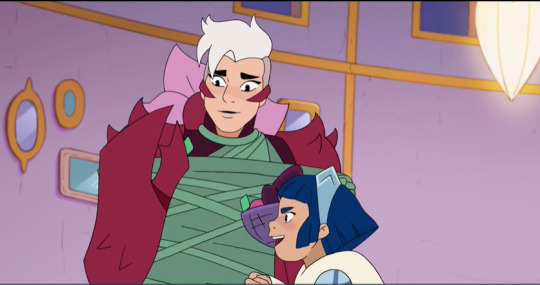
There's another interesting counterexample to Horde Loyalty. Adora repeatedly breaks with the people around her to do what is right. First she leaves the Horde, then walks away from Catra by stages when it is clear that Catra is going to continue to harm other people and Etheria. Then she walks away from Glimmer, defies Light Hope and breaks loyalty with her supposed destiny and purposes as well as loyalty to the homelans she has never known. By season 5, Adora is loyal only to herself and the people she cares about, but she isn't constraining her will to anyone else's. For all that she seems like a rule follower Adora has a rebellious streak a mile wide, and she will do what is right, no matter what. This is what allows her to save the universe 3 times.
So the show’s argument is that loyalty is not a good moral framework to base all of our actions around. I don’t think it goes so far as saying that loyalty has no place in our ethics (being a good friend, which is such a huge part of the show, certainly includes loyalty, especially sticking with people when the going gets tough), but the show stresses time and again that being loyal to something or someone shouldn’t make you disregard yourself and what you think is right. Because it’s only by living out our own values and taking responsibility for our own actions that we can come into our own as moral beings. Moreover, if we insist on maintaining loyalty to institutions that oppress us and others, we can’t dismantle the systems of oppression that are holding us and other people down. (Yes, this is a pretty radical message, but I suspect that Noelle is some kind of anarchist? Anyway, it’s a thing.)
Okay, so that’s what I, a 35 year old, get from this kids show. I think it’s also worth pointing out that this lesson applies to younger viewers too, in their most immediate lives. Younger viewers will have had friends who didn’t treat them well, or might not have treated other people well, and who might have pressured them into participating in the mistreatment of others (this is kind of how bullying works a lot of the time). I think it’s important that younger viewers see how being a good friend never means disrespecting yourself or other people and it means a lot to me that She-Ra shows this in such a nuanced and realistic way.
#she ra#she ra spoilers#spop#she ra netflix#she ra and the princesses of power#meta#analysis#scorpia
167 notes
·
View notes
Note
How do you think Roose will meet his demise? Or will he survive? What's your best Roose end game predictions?
Thank you for the question! This will be a long post under the readmore, going into my thoughts on the show ending and exploring what the books may have set up in regards to themes and characterization, as well as a bit of general analysis of Roose' story arc in a Dance with Dragons (and some speculation about Ramsay as well).
If you click on the readmore i will have divided the post into sections with bolded Headers, if you want to only read my specific endgame ideas you can skip ahead to the "His Endgame?" section.
In The Show
The show had him get killed by Ramsay in s6, which informs a lot of the fandom speculation about this storyline.
I am not a fan of the show's scenario as it was both similar to tywin and tyrion as well as a mirror of robb's death; it would also be offscreen in the books since neither of the characters are PoVs and Ramsay would need to do the act in secret. This would ultimately undercut Roose' role and impact, being a death scene that is not very unique and also isn't shown to the reader directly. Since no PoV is even in Winterfell currently, we would just hear of it from afar and not witness the consequences.
The show also has a different dynamic in the Bolton storyline, emphasizing Ramsay as the "main character" of this arc, and elevating him to the main villain for s5-6 to fill Joffrey's shoes as an evil character played by a very charismatic actor. Ramsay's show writing is informed by the needs of a TV setting that wants shocking moments and capitalizes on "fan favourite" actors; his rising importance in the show thus is not necessarily an indicator of his book importance. The show was also missing many central characters like the northern lords and the Frey men in Winterfell.
The show had a tendency to kill off characters early when they wanted to cull storylines or had no plans to adapt more of the character's story (like Stannis, Barristan, possibly the Tyrells...); In Mance Rayder we have the most obvious example, where they killed him off for real in a scene that in the book was a misdirection. We also have characters like Jorah where it appears the showrunners had their own choice of how they want his storyline to end, even if Grrm has his own ending in mind.
"For a long time we wanted Ser Jorah to be there at The Wall in the end," writer Dave Hill says. "The three coming out of the tunnel would be Jon and Jorah and Tormund. But [...] Jorah should have the noble death he craves defending the woman he loves." - Dave Hill for Entertainment Weekly
So a death in the show does not need to be an indicator that the books will feature an equivalent scene, even if it gives a hint as to what may happen. By s5 the show has become its own beast, and the butterfly effects from radical changes they made as well as the different characterizations results in the show having to cater to its own needs in many cases when it gets to resolving a plotline.
"We reconceived the role to make it worthy of the actor's talents." - Benioff and Weiss for the s5 DVD commentary, on Indira Varma's casting as Ellaria
In The Books
(Since this post was getting out of hand in length a lot of these arguments are a little shortened/not as in-depth as i'd like! Feel free to inquire more via ask if something is unclear or you disagree)
In the books i find it hard to make a concrete guess as to how it will end. Occam's razor would be to assume the show sort of got it right and that it will vaguely end the same, which could very well happen and i will not discount the possibility; Ramsay is cruel, desires the Dreadfort rule, and is a suspected kinslayer and has no qualms to commit immoral violence.
"Ramsay killed [his brother]. A sickness of the bowels, Maester Uthor says, but I say poison." - Reek III, aDwD
Reek saw the way Ramsay's mouth twisted, the spittle glistening between his lips. He feared he might leap the table with his dagger in his hand [to attack his father]. - Reek III, aDwD
Arguments against this or for a different endgame come down to interpretations of the themes in the story arc and opinions on dramatic structure/grrm's writing, and are thus very subjective.
The way the story currently is going, Ramsay killing Roose treats Roose almost as a plot device; his death brings no change or development to Ramsay's character as we already know his motivations and cruelty align with such an act, and we can assume that he would feel no remorse about it either. The results of such a scene would be firmly on a story level, as it brings political changes and moves the plot along into a specific direction. Roose himself cannot have any relevant character development about it as he does not have a PoV and we would not be able to witness his reaction from the outside.
“The only thing worth writing about is the human heart in conflict with itself.” - William Faulkner, often quoted by Grrm
Further, killing his father is very difficult to pull off in secret (Roose is frequently described as very cautious, and employs many guardsmen). And even if Ramsay pulls it off (people often interpret Ramsay as Roose' blind spot, assuming he might be caught by surprise, not expecting Ramsay would bite the hand that feeds him), Roose is the one that holds his entire alliance together; The Freys would be alienated by Ramsay who would antagonize Walda and her son as his rivals, The Ryswell bloc appears to dislike Ramsay (especially Barbrey), and the other northmen are implied to not even like Roose himself. Killing Roose would quickly combust the entire northern faction, and hinder Ramsay's further plans (another reason why I am not convinced of a book version of the "Battle of Bastards"). Though this might of course, if we look at it from the other side, be grrm's plan to quickly dissolve this plot and move the northern story forwards.
"Ramsay will kill [Walda's children], of course. [...] [She] will grieve to see them die, though." - Reek III, aDwD
"How many of our grudging friends do you imagine we'd retain if the truth were known? Only Lady Barbrey, whom you would turn into a pair of boots … inferior boots." - Reek III, aDwD
"Fear is what keeps a man alive in this world of treachery and deceit. Even here in Barrowton the crows are circling, waiting to feast upon our flesh. The Cerwyns and the Tallharts are not to be relied on, my fat friend Lord Wyman plots betrayal, and Whoresbane … the Umbers may seem simple, but they are not without a certain low cunning. Ramsay should fear them all, as I do." - Reek III, aDwD
Roose' death at Ramsay's hand also removes him thematically from the Red Wedding, as we can assume such a death might have happened regardless of his participation in the event (seeing as Ramsay is getting provoked by Roose constantly in normal dialogue, and has a general violent disposition). Roose already took Ramsay in before aGoT started, and married Walda very early in the war, which is already most of the buildup that the show's scenario had. It also has little to do with the The North Remembers plot except set dressing, since the northmen are presumably neither collaborating with/egging on Ramsay nor would they appreciate the development.
Themes: Ned Stark and the rule over the North
Roose is treated as a foil to Eddard; They are often contrasted in morals and ruling styles, while also having many superficial similarities that further connect them (they are seen as cold by people, grey eyed, patriarchs of rivalling northern houses, etc...).
Pale as morning mist, his eyes concealed more than they told. Jaime misliked those eyes. They reminded him of the day at King's Landing when Ned Stark had found him seated on the Iron Throne. - Jaime IV, aSoS
They both have a "bastard son" that they handle very differently; Roose treating Ramsay in the way that is seen as common in their society. Ramsay and Jon as a comparison are meant to show that Catelyn had a reason to see a bastard as a threat (since Domeric was antagonized by his bastard brother), but also shows that her suggested plan for Jon would not have stopped any danger either (as Ramsay being raised away from the castle didn't help).
And if his seed quickened, she expected he would see to the child's needs. He did more than that. The Starks were not like other men. Ned brought his bastard home with him, and called him "son" for all the north to see. - Catelyn II, aGoT
"Each year I sent the woman some piglets and chickens and a bag of stars, on the understanding that she was never to tell the boy who had fathered him. A peaceful land, a quiet people, that has always been my rule." - Reek III, aDwD
It appears to me that Roose' story functions in some ways as an inversion to Ned. He makes an attempt to grab a power he was not destined to (becoming warden of the north), where Ned did not want the responsiblity thrust upon him ("It was all meant for Brandon. [...] I never asked for this cup to pass to me." - Cat II, aGoT). Where Ned rules successfully and his northmen honor his legacy ("What do you think passes through their heads when they hear the new bride weeping? Valiant Ned's precious little girl." - The Turncloak, aDwD), the Boltons are largely hated and there are several plots conspiring against them ("Let me bathe in Bolton blood before I die." - The King's Prize, aDwD).
It seems possible to me that in terms of their family and legacy, Roose might also live through an inverted version of Ned's story; where Ned died first, leaving his family behind, Roose already lived to see the death of his wives and trueborn heir, and might thus also live to see Ramsay's death. Ned leaves behind well raised children and a North who still respects his name, and even though he dies it will presumably all be "in good hands" in the end (in broad strokes, obviously this is all much more morally complex). Roose however built up a bad and toxic legacy, and also built his way of life around evading consequences; it makes sense to me that he would be forced by the story to finally endure all the consequences of his actions and witness the fall of his house firsthand. After all we already have Tywin who fulfils the purpose of dying before his children while his legacy falls to ruins, and a Feast for Crows explores this aspect thoroughly.
Roose' arc in A Dance With Dragons
The story repeatedly builds up the situation unravelling around Roose, and him slowly losing a grip on it and becoming more stressed and anxious.
Reek wondered if Roose Bolton ever cried. If so, do the tears feel cold upon his cheeks? - Reek II, aDwD
Roose Bolton said nothing at all. But Theon Greyjoy saw a look in his pale eyes that he had never seen before—an uneasiness, even a hint of fear. [...] That night the new stable collapsed beneath the weight of the snow that had buried it. - a Ghost in Winterfell, aDwD
Lady Walda gave a shriek and clutched at her lord husband's arm. "Stop," Roose Bolton shouted. "Stop this madness." His own men rushed forward as the Manderlys vaulted over the benches to get at the Freys. - Theon I, aDwD
It also directly presents him as a parallel to Theon's rule in aCoK, who similarly experienced a very unpopular rule and his subjects slowly turning against him. Presumably, the point of this comparison will not just be "Ramsay comes in at the end and unexpectedly whacks them on the head". Both Theon and Roose invited Ramsay into their lives, giving him more power than he deserves, and causing Ramsay to make choices that increasingly alienate others from them (the death of the miller's boys for example has repercussions for both Theon and Roose). Grrm is likely steering this towards a difference in how they will deal with this situation.
It all seemed so familiar, like a mummer show that he had seen before. Only the mummers had changed. Roose Bolton was playing the part that Theon had played the last time round, and the dead men were playing the parts of Aggar, Gynir Rednose, and Gelmarr the Grim. Reek was there too, he remembered, but he was a different Reek, a Reek with bloody hands and lies dripping from his lips, sweet as honey. - a Ghost in Winterfell, aDwD
"Stark's little wolflings are dead," said Ramsay, sloshing some more ale into his cup, "and they'll stay dead. Let them show their ugly faces, and my girls will rip those wolves of theirs to pieces. The sooner they turn up, the sooner I kill them again." - The elder Bolton sighed. "Again? Surely you misspeak. You never slew Lord Eddard's sons, those two sweet boys we loved so well. That was Theon Turncloak's work, remember? How many of our grudging friends do you imagine we'd retain if the truth were known?" - Reek III, aDwD
Roose' arc is deeply connected to the relations he shares to the other northern lords, which has been heavily impacted by the Red Wedding. It stands to reason that they are going to be an important part of his downfall, and we see many hints of them plotting to betray him.
The north remembers, Lord Davos. The north remembers, and the mummer's farce is almost done. My son is home." - Davos IV, aDwD
Themes: Stannis and kinslaying
The books set up Roose and Stannis as foils as well; Both lack charisma and have trouble winnning the people's support, Stannis and Roose both parallel and contrast Ned, Stannis appears as a "lesser Robert" where Roose is a "lesser Ned", Stannis represents the fire where Roose represents the ice, both struggle over dominion in a land that doesnt particularly want either of them, etc... What i find interesting is how they are contrasted over kinslaying:
"Only Renly could vex me so with a piece of fruit. He brought his doom on himself with his treason, but I did love him, Davos. I know that now. I swear, I will go to my grave thinking of my brother's peach." - Davos II, aCoK
"I should've had the mother whipped and thrown her child down a well … but the babe did have my eyes." [...] "Now [Domeric's] bones lie beneath the Dreadfort with the bones of his brothers, who died still in the cradle, and I am left with Ramsay. Tell me, my lord … if the kinslayer is accursed, what is a father to do when one son slays another?" - Reek III, aCoK
Stannis is set up as someone who is very thorough and strict in following his own code and his "duty", even if he does not like what it forces him to do.
Stannis ground his teeth again. "I never asked for this crown. Gold is cold and heavy on the head, but so long as I am the king, I have a duty . . . If I must sacrifice one child to the flames to save a million from the dark . . . Sacrifice . . . is never easy, Davos. Or it is no true sacrifice. Tell him, my lady." - Davos IV, aSoS
The armorer considered that a moment. "Robert was the true steel. Stannis is pure iron, black and hard and strong, yes, but brittle, the way iron gets. He'll break before he bends." - Jon I, aCoK
Roose however is frequently characterized as someone who tries to get as much as he can while avoiding negative consequences, and who does not have a consistent moral code and instead bends rules to his benefit to be the most comfortable to him.
It is often theorized that Stannis will end up burning his daughter Shireen; the Ramsay issue might then serve to contrast the two men. If Grrm intends it to be compared by the reader, I can see it going two ways: Either Roose will be forced to finally act in a drastic way after avoiding his responsibility in regards to Ramsay and he will be forced to get rid of his son, making him break the only moral hurdle he has presented adhering to during the story (though analyzing his character, the kinslaying taboo is probably less a sign of moral fortitude and more him using the guise of morals to explain a selfish motivation). Or he might not act against Ramsay and suffer the consequences, presenting an interesting moral situation where some readers might consider his action "better" or more relatable than Stannis', breaking up the otherwise very black and white moral comparison between the two men. It serves as an interesting conflict of the morality of kinslaying compared to what readers might see as a moral obligation of getting rid of a monster such as Ramsay; contrasting Shireen whose death would not be seen as worth it by most. Ramsay as a bastard (who was almost killed at birth if he hadnt been able to prove his paternity) also makes for an interesting verbal parallel with the bastard Edric Storm, and might be used for a look at the utilitarian principle of killing a child (baby ramsay/edric) to save countless people from suffering that underpinned Edric's story.
"As Faulkner says, all of us have the capacity in us for great good and for great evil, for love but also for hate. I wanted to write those kinds of complex character in a fantasy, and not just have all the good people get together to fight the bad guy." - Grrm
"Robert, I ask you, what did we rise against Aerys Targaryen for, if not to put an end to the murder of children?" - Eddard VIII, aGoT
"If Joffrey should die . . . what is the life of one bastard boy against a kingdom?" - "Everything," said Davos, softly. - Davos V, aSoS
However Grrm decides to present these conflicts or which actions the characters will take in the end, it will result in interesting discussion and analysis for the readers.
His Endgame?
Looking at the trends of the past books, it is probably going to be hard to predict any specific outcome; every book introduces new characters and plot elements that were impossible to predict from the last book even if their thematic importance or setup was aptly foreshadowed.
Roose has a lot of plot importance and characterization that has, in my opinion, not yet been properly resolved in a way that would be unique and poignant to the specific purpose his character appears to fulfil. However I also have a bias in that i did not like the show's writing of that scene which makes me averse to see a version of it in the books, and i really like Roose as a character and want to see him have more scenes in the next book(s). This leads me to discount plot speculation that cuts his character arc short offscreen early. Roose is only a side character; however, i have trust in grrm's writing abilities and that he would give him a proper sendoff that feels satisfying to a fan of the character.
"…even the [characters] who are complete bastards, nasty, twisted, deeply flawed human beings with serious psychological problems… When I get inside their skin and look out through their eyes, I have to feel a certain — if not sympathy, certainly empathy for them. I have to try to perceive the world as they do, and that creates a certain amount of affection." — George Martin
Considering my earlier analyis, there is a case to be made for Roose killing Ramsay; however it appears grrm might have a different endgame in mind for Ramsay, foreshadowed in Chett's prologue:
There'd be no lord's life for the leechman's son, no keep to call his own, no wives nor crowns. Only a wildling's sword in his belly, and then an unmarked grave. The snow's taken it all from me . . . the bloody snow . . . - Chett, aSoS
I tend to think something might happen to Roose/the Bolton bloc later in the book that would cause Ramsay to attempt to flee the scene again like he did back in aCoK fleeing Rodrik's justice; perhaps Ramsay is sent out to battle but then flees it like a coward, or he sees his cause as lost. This time, the fleeing and potentially disguised Ramsay would not make it out to safety though, and get killed without being recognized as Ramsay, dying forgotten. This would serve as dramatic irony since Ramsay so strongly desired to be recognized and respected as a Lord of Bolton, without being too on the nose.
As for Roose, i could see him getting captured and somehow brought to justice (either when someone takes Winterfell or in some sort of battle). I see it unlikely that he will be backstabbed like Robb was, because it seems very "eye for an eye" and ultimately doesn't teach much of a lesson except "he had it coming"; But the various people conspiring against him could lead to his capture by betraying him (giving a payoff to the northern conspiracies and the red wedding). I would find a scene of him standing trial interesting since i believe we didn't have one of these for a true non-pov villain yet, and it would be an interesting confrontation that he cannot escape from (he also loves to talk so it would be a good read to see him make a case for himself).
I assume Roose will be out of the picture when the Other plot finally properly kicks into gear (whether dead or "in prison"). With Stannis as a false Azor Ahai and Roose as a false Other (with his pale, cold features), their struggle in the north seems to be a representation of the false "Game of Thrones" that distracts people from the "real threat" of the Others.
As always this is just my opinion, and it could all go very differently in the books! There could always be something that completely uproots my analysis and goes into a direction i did not expect from the material we had; But i have fate that Grrm as a writer will deliver and give me something i can be satisfied with.
120 notes
·
View notes
Text
i watched red vs blue: zero with my dear friends today and i was asked to “post” my “thoughts” on the subject. Please do not click this readmore unless, for some reason, you want to read three thousand words on the subject of red vs blue: zero critical analysis. i highly doubt that’s the reason anyone is following me, but hey.
anyway. here you have it.
Here are my opinions on RVB0 as someone who has quite literally no nostalgia for any older RVB content. I’ve seen seasons 1-13 once and bits and pieces of it more than once here and there, but I only saw it for the first time within the past couple of months. I’ve literally never seen any other RT/AH content. I can name a few people who worked on OG Red vs. Blue but other than Mounty Oum I have NO idea who is responsible for what, really, or what anything else they’ve ever worked on is, or whether or not they’re awful people. I know even less about the people making RVB0 - All I know is that the main writer is named Torrian but I honestly don’t even know if that’s a first name, a last name, or a moniker. All this to say; nothing about my criticism is rooted in any perceived slight against the franchise or branding by the new staff members, because I don’t know or care about any of it. In fact, I’m going to try and avoid any direct comparison between RVB0 and earlier seasons of RVB as a means of critique until the very end, where I’ll look at that relationship specifically.
So here is my opinion of RVB0 as it stands right now:
1. The Writing
Everything about RVB0 feels as if it was written by a first-time writer who hasn’t learned to kill his darlings. The narrative is both simultaneously far too full, leaving very little breathing room for character interaction, and oddly sparse, with a story that lacks any meaningful takeaway, interesting ideas, or genuine emotional connection. It also feels like it’s for a very much younger audience - I don’t mean this as a negative at all. I love tv for kids. I watch more TV for kids than I do for adults, mostly, but I think it’s important to address this because a lot of the time ‘this is for kids’ is used to act like you’re not allowed to critique a narrative thoroughly. It definitely changes the way you critique it, but the critique can still be in good faith. I watched the entirety of RVB0 only after it was finished, in one sitting, and I was giving it my full attention, essentially like it was a movie. I’m going to assume it was much better to watch in chunks, because as it stood, there was literally no time built into the narrative to process the events that had just transpired, or try and predict what events might be coming in the future. When there’s no time to think about the narrative as you’re watching it, the narrative ends up as being something that happens to the audience, not something they engage with. It’s like the difference between taking notes during a lecture or just sitting and listening. If you’re making no attempt to actively process what’s happening, it doesn’t stick in your mind well. I found myself struggling to recall the events and explanations that had immediately transpired because as soon as one thing had happened, another thing was already happening, and it was like a mental juggling act to try and figure out which information was important enough to dwell on in the time we were given to dwell on it.
Which brings me to another point - pacing. Every event in the show, whether a character moment, a plot moment, or a fight scene, felt like it was supposed to land with almost the exact same amount of emotional weight. It all felt like The Most Important Thing that had Yet Happened. And I understand that this is done as an attempt to squeeze as much as possible out of a rather short runtime, but it fundamentally fails. When everything is the most important thing happening, it all fades into static. That’s what most of 0’s narrative was to me: static. It’s only been a few hours since I watched it but I had to go step by step and type out all of the story beats I could remember and run it by my friends who are much more enthusiastic RVB fans than I am to make sure I hadn’t missed or forgotten anything. I hadn’t, apparently, but the fact that my takeaway from the show was pretty accurate and also disappointingly lackluster says a lot. Strangely enough, the most interesting thing the show alluded to - a holo echo, or whatever the term they used was - was one of the things least extrapolated upon in the show’s incredibly bulky exposition. Benefit of the doubt says that’s something they’ll explore in future seasons (are they getting more? Is that planned? I just realized I don’t actually know.)
And bulky it was! I have quite honestly never seen such flagrant disregard for the rule of “show, don’t tell.” There was not a single ounce of subtlety or implication involved in the storytelling of RVB0. Something was either told to you explicitly, or almost entirely absent from the narrative. Essentially zilch in between. We are told the dynamic the characters have with each other, and their personality pros and cons are listed for us conveniently by Carolina. The plot develops in exposition dumps. This is partially due to the series’ short runtime, but is also very much a result of how that runtime was then used by the writers. They sacrificed a massive chunk of their show for the sake of cramming in a ton of fight scenes, and if they wanted to keep all of those fight scenes, it would have been necessary to pare down their story and characters proportionally in comparison, but they didn’t do that either. They wanted to have it both ways and there simply wasn’t enough time for it.
The story itself is… uninteresting. It plays out more like the flimsy premise of a video game quest rather than a piece of media to be meaningfully engaged with. RVB0 is I think something I would be pitched by a guy who thinks the MCU and BNHA are the best storytelling to come out of the past decade. It is nothing but tropes. And I hate having to use this as an insult! I love tropes. The worst thing about RVB0 is that nothing it does is wholly unforgivable in its own right. Hunter x Hunter, a phenomenal shonen, is notoriously filled with pages upon pages of detailed exposition and explanations of things, and I absolutely love it. Leverage, my favorite TV show of all time, is literally nothing but a five man band who has to learn to work as a team while seemingly systematically hitting a checklist of every relevant trope in the book. Pacific Rim is an incredibly straightforward good guys vs giant monsters blockbuster to show off some cool fight scenes such as a big robot cutting an alien in half with a giant sword, and it’s some of the most fun I ever have watching a movie. Something being derivative, clunky, poorly executed in some specific areas, narratively weak, or any single one of these flaws, is perfectly fine assuming it’s done with the intention and care that’s necessary to make the good parts shine more. I’ll forgive literally any crime a piece of media commits as long as it’s interesting and/or enjoyable to consume. RVB0 is not that. I’m not sure what the main point of RVB0 was supposed to be, because it seemingly succeeds at nothing. It has absolutely nothing new or innovative to justify its lack of concern for traditional storytelling conventions. Based solely on the amount of screentime things were given, I’d be inclined to say the narrative existed mostly to give flimsy pretense for the fight scenes, but that’s an entire other can of worms.
2. The Visuals + Fights
I have no qualms with things that are all style and no substance. Sometimes you just want to see pretty colors moving on the screen for a while or watch some cool bad guys and monsters or whatever get punched. RVB0 was not this either. The show fundamentally lacked a coherent aesthetic vision. Much of the show had a rather generic sci-fi feel to it with the biggest standouts to this being the very noir looking cityscape, which my friends and I all immediately joked looked like something from a batman game, or the temple, which my friends and I all immediately joked looked like a world of warcraft raid. They were obviously attempting to get variety in their environment design, which I appreciate, but they did this without having a coherent enough visual language to feel like it was all part of the same world. In general, there was also just a lack of visual clarity or strong shots. The value range in any given scene was poor, the compositions and framing were functional at best, and the character animation was unpleasantly exaggerated. It just doesn’t really look that good beyond fancy rendering techniques.
The fight scenes are their entire own beast. Since ‘FIGHT SCENE’ is the largest single category of scenes in the show, they definitely feel worth looking at with a genuine critical eye. Or, at least, I’d like to, but honestly half the time I found myself almost unable to look at them. The camera is rarely still long enough to really enjoy what you’re watching - tracking the motion of the character AND the camera at such constant breakneck high speeds left little time to appreciate any nuances that might have been present in the choreography or character animation. I tried, believe me, I really did, but the fight scenes leave one with the same sort of dizzy convoluted spectacle as a Michael Bay transformers movie. They also really lacked the impact fight scenes are supposed to have.
It’s hard to have a good, memorable fight scene without it doing one of three things: 1. Showing off innovative or creative fighting styles and choreography 2. Making use of the fight’s setting or environment in an engaging and visually interesting way or 3. Further exploring a character’s personality or actions by the way they fight. It’s also hard to do one of these things on its own without at least touching a bit on the other two. For the most part, I find RVB0’s fight scenes fail to do this. Other than rather surface level insubstantial factors, there was little to visually distinguish any of RVB0’s fight scenes from each other. Not only did I find a lot of them difficult to watch and unappealing, I found them all difficult to watch and unappealing in an almost identical way. They felt incredibly interchangeable and very generic. If you could take a fight scene and change the location it was set and also change which characters were participating and have very little change, it’s probably not a good fight scene.
I think “generic” is really just the defining word of RVB0 and I think that’s also why it falls short in the humor department as well.
3. The Comedy
Funny shit is hard to write and humor is also incredibly subjective but I definitely got almost no laughs out of RVB0. I think a total of three. By far the best joke was Carolina having a cast on top of her armor, which, I must stress, is an incredibly funny gag and I love it. But overall I think the humor fell short because it felt like it was tacked on more than a natural and intentional part of this world and these characters. A lot of the jokes felt like they were just thrown in wherever they’d fit, without any build up to punchlines and with little regard for what sort of joke each character would make. Like, there was some, obviously Raymond’s sense of humor had the most character to it, but the character-oriented humor still felt very weak. When focusing on character-driven humor, there’s a LOT you can establish about characters based on what sort of jokes they choose to make, who they’re picking as the punchlines of these jokes, and who their in-universe audience for the jokes is. In RVB0, the jokes all felt very immersion-breaking and self aware, directed wholly towards the audience rather than occurring as a natural result of interplay between the characters. This is partially due to how lackluster the character writing was overall, and the previously stated tight timing, but also definitely due to a lack of a real understanding about what makes a joke land.
A rule of thumb I personally hold for comedy is that, when push comes to shove, more specific is always going to be more funny. The example I gave when trying to explain this was this:
saying two characters had awkward sex in a movie theater: funny
saying two characters had an awkward handjob in a cinemark: even funnier
saying two characters spent 54 minutes of 11:14's 1:26 runtime trying out some uncomfortably-angled hand stuff in the back of a dilapidated cinemark that lost funding halfway through retrofitting into a dinner theater: the funniest
The more specific a joke is, the more it relies on an in-depth understanding of the characters and world you’re dealing with and the more ‘realistic’ it feels within the context of your media. Especially with this kind of humor. When you’re joking with your friends, you don’t go for stock-humor that could be pulled out of a joke book, you go for the specific. You aim for the weak spots. If a set of jokes could be blindly transplanted into another world, onto another cast of characters, then it’s far too generic to be truly funny or memorable. I don’t think there’s a single joke in RVB0 where the humor of it hinged upon the characters or the setting.
Then there’s the issue of situational comedy and physical comedy. This is really where the humor being ‘tacked on’ shows the most. Once again, part of what makes actually solid comedy land properly is it feeling like a natural result of the world you have established. Real life is absurd and comical situations can be found even in the midst of some pretty grim context, and that’s why black comedy is successful, and why comedy shows are allowed to dip into heavier subject matter from time to time, or why dramas often search for levity in humor. It’s a natural part of being human to find humor in almost any situation. The key thing, though, once again, is finding it in the situation. Many of RVB0’s attempts at humor, once again, feel like they would be the exact same jokes when stripped from their context, and that’s almost never good. A pretty fundamental concept in both storytelling in general but particularly comedy writing is ‘setup and payoff’. No joke in RVB0 is a reward for a seemingly innocuous event in an earlier scene or for an overlooked piece of environmental design. The jokes pop in when there’s time for them in between all the exposition and fighting, and are gone as soon as they’re done. There’s no long term, underlying comedic throughline to give any sense of coherence or intent to the sense of humor the show is trying to establish. Every joke is an isolated one-off quip or one-liner, and it fails to engage the audience in a meaningful way.
All together, each individual component of RVB0 feels like it was conjured up independently, without any concern to how it interacted with the larger product they were creating. And I think this is really where it all falls apart. RVB0 feels criminally generic in a way reminiscent of mass-market media which at least has the luxury of attributing these flaws, this complete and total watering down of anything unique, to heavy oversight and large teams with competing visions. But I don’t think that’s the case for RVB0. I don’t know much about what the pipeline is like for this show, but I feel like the fundamental problem it suffers from is a lack of heart.
In comparison to Red vs. Blue
Let's face it. This is a terrible successor to Red vs. Blue. I wouldn’t care if NONE of the old characters were in it - that’s not my problem. I haven’t seen past season 13 because from what I heard the show already jumped the shark a bit and then some. That’s not what makes it a poor follow up. What makes it a bad successor is that it fundamentally lacks any of the aspects of the OG RVB that made it unique or appealing at all. I find myself wondering what Torrian is trying to say with RVB0 and quite literally the only answer I find myself falling back onto is that he isn’t trying to say anything at all. Regardless of what you feel about the original RVB, it undeniably had things to say. The opening “why are we here” speech does an excellent job at establishing that this is a show intended to poke fun at the misery of bureaucracy and subservience to nonsensical systems, not just in the context of military life, but in a very broad-strokes way almost any middle-class worker can relate to. At the end of the day, fiction is at its best when it resonates with some aspect of its audience’s life. I know instantly which parts of the original Red vs Blue I’m supposed to relate to. I can’t say anything even close to that about 0.
RVB is an absurdist parody that heavily satirizes aspects of the military and life as a low-on-the-food-chain worker in general that almost it’s entire target audience will be familiar with. The most significant draw of the show to me was how the dialogue felt like listening to my friends bicker with each other in our group chats. It required no effort for me to connect with and although the narrative never outright looked to the camera and explained ‘we are critiquing the military’s stupid red tape and self-fullfilling eternal conflict’ they didn’t need to, because the writing trusted itself and its audience enough to believe this could be conveyed. It is, in a way, the complete antithesis to the badass superhero macho military man protagonist that we all know so well. RVB was saying something, and it was saying it in a rather novel format.
Nothing about RVB0 is novel. Nothing about RVB0 says anything. Nothing about it compels me to relate to any of these characters or their situations. RVB0 doesn’t feel like absurdism, or satire. RVB0 feels like it is, completely uncritically, the exact media that RVB itself was riffing off of. Both RVB0 and RVB when you watch them give you the feeling that what you’re seeing here is kids on a playground larping with toy soldiers. It’s all ridiculous and over the top cliche stupid garbage where each side is trying to one-up the other. The critical difference is, in RVB, we’re supposed to look at this and laugh at how ridiculous this is. In RVB0 we’re supposed to unironically think this is all pretty badass.
The PFL arc of the original RVB existed to show us that setting up an elite team of supersoldiers with special powers was something done in bad faith, with poor outcomes, that left everyone involved either cruel, damaged, or dead. It was a bad thing. And what we’re seeing in RVB0 is the same premise, except, this time it’s good. We’re supposed to root for this format. RVB0 feels much more like a demo reel, cutscenes from a video game that doesn’t exist, or a shonen anime fanboy’s journal scribbling than it feels like a piece of media with any objective value in any area. In every area that RVB was anti-establishment, RVB0 is pure undiluted establishment through and through.
205 notes
·
View notes
Text
The metanarrative’s grand narrative: Osomatsu-san’s characterization throughout the franchise
The growing cynicism throughout the entire Osomatsu-san franchise shows itself in season 3 with more prominence than anything prior. I think that’s pretty common amongst any “long-running” gag comedy - replacing a plot with spiteful commentary that’s admittedly pretty hit or miss at times. However, it invariably creates a negative but pretty funny character growth, and I love the way the show (I’m including the movie too as “canon” material considering season 3 has referenced it way too many times for me to disregard) has set up this metanarrative across seasons. Long post ahead.
Obviously, Osomatsu-san is self-aware and has a casual relationship with itself. No linear plot (though S3 seems to be trying it out and I’ve enjoyed it - I love that they’re willing to experiment), rather a collection of unrelated skits; and so it points out its own metanarrative because of this “lack of consequences.” With comedy comes impermancy and Ososan AND -kun will always bounce back from that week’s insanity. From the Oxford Dictionary, a metanarrative is “a narrative account that experiments with or explores the idea of storytelling, often by drawing attention to its own artificiality.” Basically: a story about stories.
On top of this, is what I’m calling the “grand narrative,” which is often used interchangeably with metanarrative, but here I’m making a distinction to make it less confusing. Of course, Ososan is a story about stories, but with that comes a story it’s not directly telling, which is where most of the (little) character development is taking place. This is what I’m going to call the grand narrative of a show whose premise is being a meta-aware comedy. I’ll admit I’m by no means an expert on these subjects, but storytelling methods are something I enjoy trying to analyze. As a media format, Ososan really utilizes the fact that it’s a tv show.
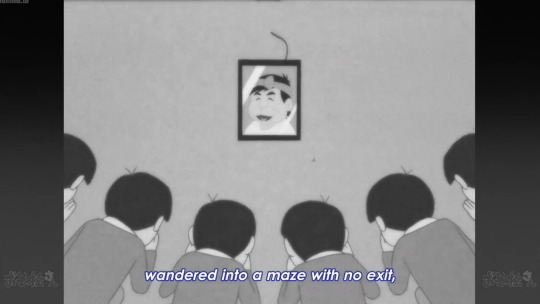
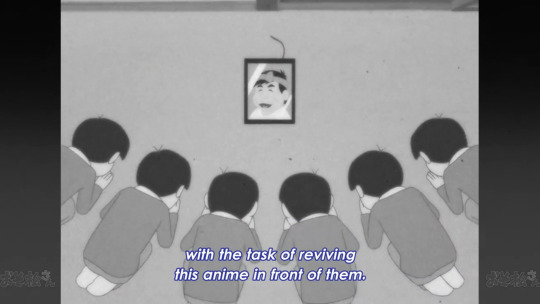
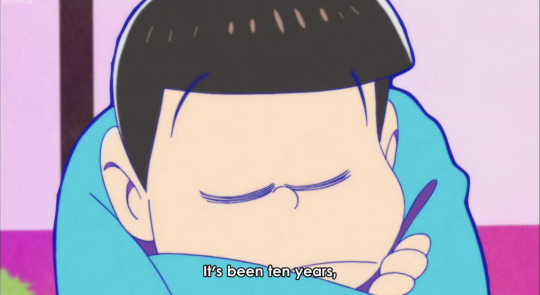
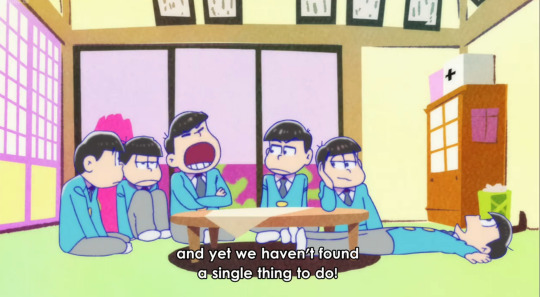
Right off the bat S1E1 makes it clear what to expect: Nothing. Not a damn thing. But, the show had already been cleared for this first season, so it has to be produced. This same episode’s preview is done by Osomatsu, which I’m just gonna quote instead screenshot because there’s too many.
“...we plan on properly starting the anime the next episode.”
“...you ended up with an extra minute, so you need me to do something to fill it?! Actually, is this anime going to be okay with episode one being like this? I’m getting worried about how the rest of this is going to be...”
“There, I used up a minute! [EPISODE ENDS]”
Episode one is not only batshit referential, but downright mocking the state of anime in 2015. Which, truthfully, I don’t have much to comment on in that regard, as I’m not an avid anime fan. However, it does this under the premise of being indecisive about what kind of anime they wanted the Osokun reboot to be.
They’ll do just about anything to stay popular and relevant considering that is, quite literally, all they have going for them as characters in the series and just being characters in general. They may be pieces of shit, but they’re likeable pieces of shit. The dynamics they’ve built upon to be entertaining is encouraged, and they’re basically just roleplaying different skits and fucking around.
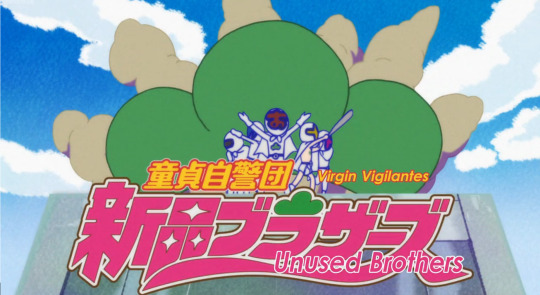
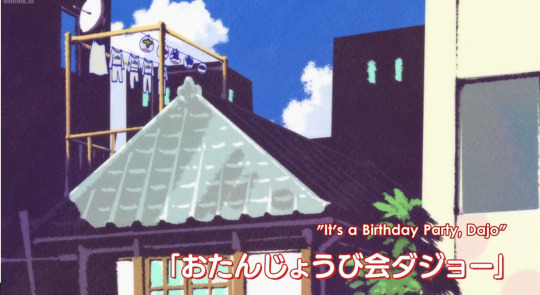
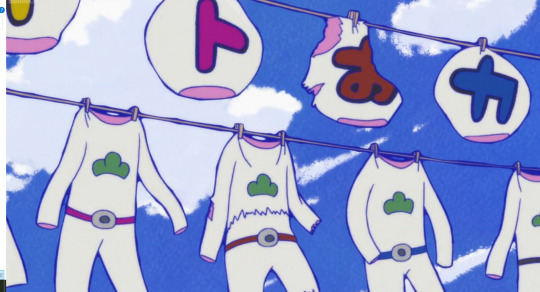
All the AUs! All the skits! They’re just playing! They’re just fuckin’ around!! They couldn’t come up with any interesting plot nor could they “graduate” from being anime protagonists and join the real world, so they just fuck around and make a gag anime!
Even if we follow both as the audience, the show makes a difference between the what’s them in their “normal life” (crazy begets crazy, no?) and what’s their “show.” But, really, that’s just one way to look at it, as they don’t really follow any rules as a show. I could say the Joshimatsus are separate characters from the sextuplets, and it’d be a “correct” interpretation. It doesn’t really matter - I’m choosing to examine it all as being the six of them just running around and playing, because being entertaining and having fun is all they know as characters. Besides, having it blended together beyond recognition reinforces how it prioritizes entertaining us, the audience, above logic. Storytelling doesn’t need to make absolute spatial-temporal sense for it to be enjoyable to fans.
In any case, that mentality really seems to be what pushes their character development negative, as they look to reinforce habits and rituals despite them being really detrimental for them in the long run. They know they’re popular characters as is, and with really everyone from staff to fans encouraging this behavior further, so they see no point in fixing what isn’t really broken.
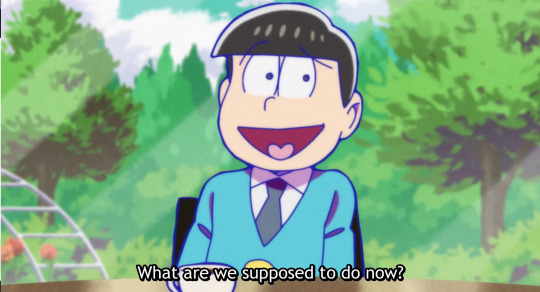

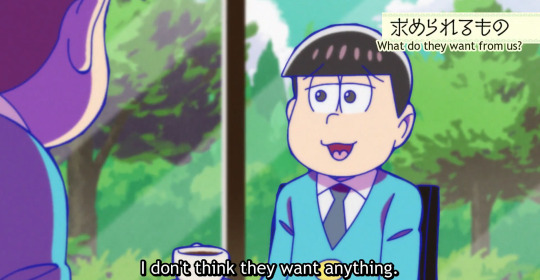
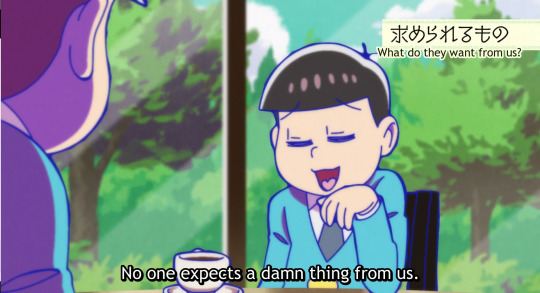
I found this 4 year old article from Manga.Tokyo discussing the Ososan phenomenon in Japan because while the craze died off pretty quickly in American anime circles (which deserves a whole other post), Japanese fans went fuckin’ nuts.
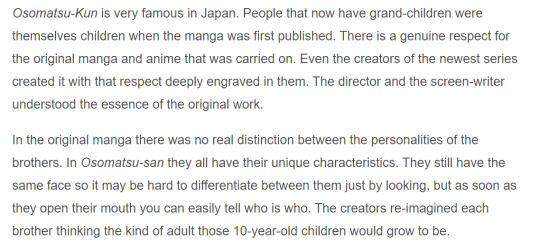
This portion caught my attention, as it makes sense that entitled and enabled asshole children would grow up to be entitled and enabled asshole adults. The article also goes on to compare them to idols (even beyond the F6 spoof) and that they are rooted in being comfort characters above all else.
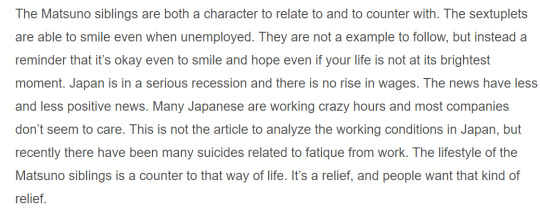
It’s worth a read, especially because Japanese fan response is what drives majority of the content post-S1, and, inevitably, ties into their character development.
They know that they’re Characters, particularly Protagonists. You know what happens to protagonists? Everything works out. Just about every single story created has stuff working out for protagonists. In fact, we have a whole genre made that separates stories with bad tragic endings from our Normal Stories. Ososan is a comedy, not a tragedy, so surely there’s gonna be some payoff somewhere along the road, especially as the seasons and other content are still being pumped out. To a self-aware, entitled, enabled protagonist, assuming everything is just gonna work out for you isn’t that far off from your narrative truth.
However, Ososan is a gag anime, and a lot of gag content (like 4koma mangas) is dropped for other projects before any emotional cathartic ending is provided for characters and fans alike. So, three seasons and a movie later, nothing has happened. It’s a great idol cash cow with a Family Guy filter, and the characters (and writers) don’t even bother to hide it anymore. And I know I’m being hypocritical concerning my definition of “canon material” but I think this portion from one of the drama cds “Choroplex” basically summarizes my point:
CHOROMATSU: Wait, don’t make this into a gag! You don’t even care about becoming employed, right?
KARAMATSU: There’s no way that could happen...
CHOROMATSU: What kind of future are you imagining? Is it nothing but this?
[HUGE PAUSE BEFORE THEY MOVE ONTO SOMETHING ELSE]
They’re parodies of themselves and are running out of ideas. Stagnation and decay is normal, if not unavoidable, at this point in time for them. They’re just 20 somethings who’ve hit a wall but they’re too scared and insecure to bring about permanent positive change. It’s easier for them to fall back into normal patterns and joke off the rest.
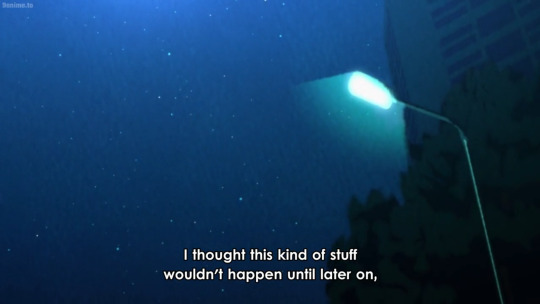
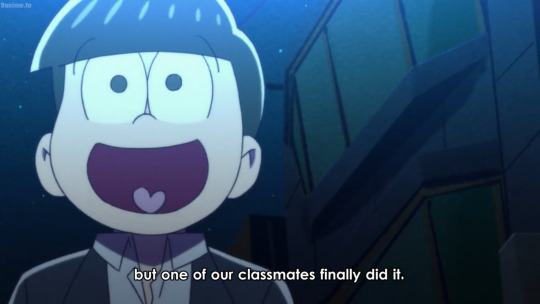
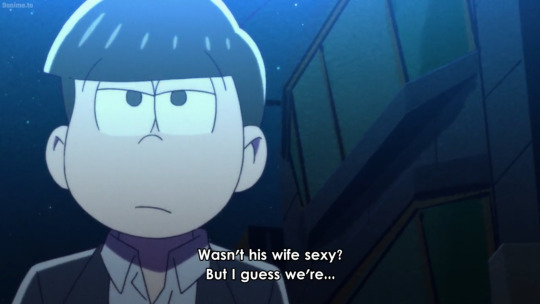
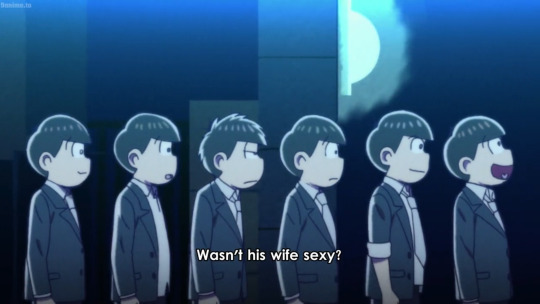
They have an antagonistic relationship with expectations. They can’t handle a single iota of expectations, or responsibilities. They’ve never needed to worry before, so why bother now? Once the biggest hits on the block, now they’re just guppies in the ocean, and there’s nothing they believe themselves to be able to accomplish to keep up with this big brave new world. This is epitomized in S3E15, where old man Osomatsu tells a bastardized version of the Tortoise and the Hare, blatantly projecting his feelings onto it. Again, too many screenshots so let me pull more quotes (bolding for my own reference):
“The place that the tortoise thought was the goal was not actually the goal. His journey down the road of life still continued on. The tortoise was quite tired, but he continued running anyway.”
“No one actually knew who was in front anymore. There are too many people above you.”
“After the tortoise found out how society worked, he thought, ‘So this is the difference in talent? No amount of hard work is going to fix this. All right. I’m done competing with others.’”
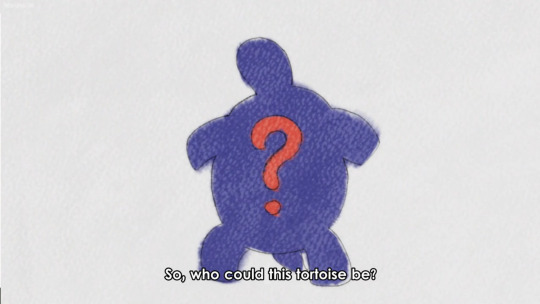
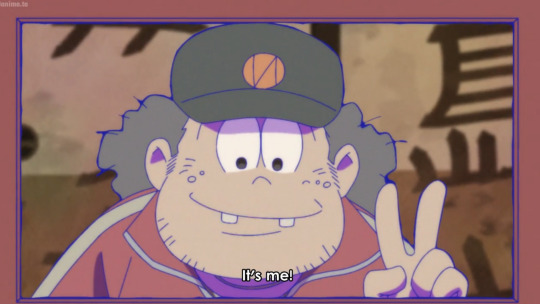
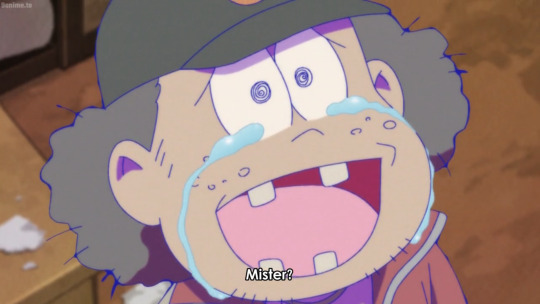
S3 has left more questionable endings than its counterparts. The last 2 skits I referenced don’t even a gag to them, and the marriage skit doesn’t play music for the entire second half of S3E5. There’s more involved too. I haven’t even brought up the rice ball twins becoming actual entertainers in their universe, or how they introduced this whole AI subplot only to reject it because All Six Of Them aren’t interested in expanding their little corner of the world. Here’s a transcript of the ending preview from S3E1:
“Hey, hey, Osomatsu here. I thought we were saved from being replaced, but I guess we get new characters next week. Man, we’re busy. New encounters, changing surroundings... We’re NEETs to begin with because all that is a pain. I guess a lot can happen after three seasons. [EPISODE ENDS]”
The sextuplets’ mindsets are extremely self-centered, which is also an environmental thing (the parents don’t even really care that they’re NEETs, for one) and an understanding of what they ought to be (epic successful protagonists). They also have a very black and white mentality, all or nothing. They’re extremely sheltered, and once they realized where they stood in society at large, they just gave up. To them the world is divided between winners and losers, and somehow, “inexplicably,” they found themselves to have fallen from grace. But they’re protagonists, that has to count for something! Everything’s gonna end up okay, right? Well... what this show has told them: No, not at all. They are consistently compared and warned of Iyami, and are perfectly aware of this fact, and have come to internalize it as a truth rather than a reversible self-fulfilling prophecy.
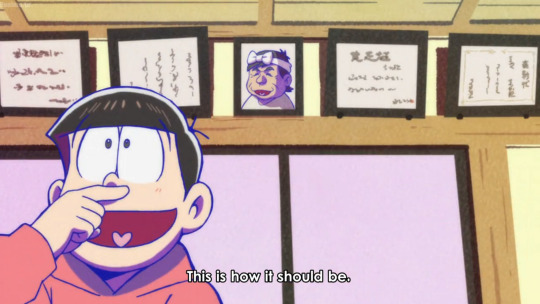
Too many screencaps, taken from the S3S5 marriage discussion:
JYUSHIMATSU: I wonder if we’re gonna get married someday, too.
CHOROMATSU: Well, I mean... probably? I’m not exactly sure, but...
TODOMATSU: What? You’re gonna get married, Choromatsu-niisan?
CHOROMATSU: Huh? Well, yeah... someday.
Surprise! They have commitment issues! The same group that couldn’t commit to a fucking plot! Though their personality issues have several factors involved, I can’t overlook the theater motifs abound. Life’s a stage, and they’re performing entirely unscripted and it shows.
Do I think all of this is 100% intentional on the writers’ part? No, probably not. There’s also an extra layer here regarding contemporary Japanese commentary that I’m not familiar with, so I just ended up focusing on the characters. I can’t be in the writers’ heads, but whatever decisions are being made by executives regarding censorship and “compliance” are reflected in these character changes that result in being significantly more bitter and defeatist.
In the all or nothing, winner-take-all mentality, the only way to save face at this point, in their minds, is to own up to it - act like it’s what they wanted all along. And, hey, it’s funny to watch, right?
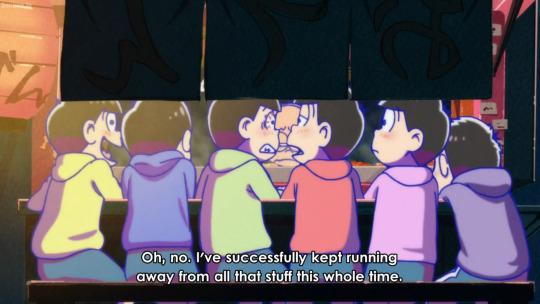
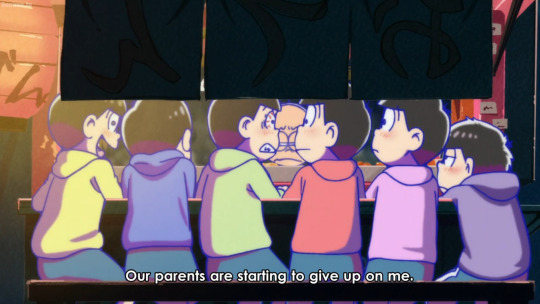
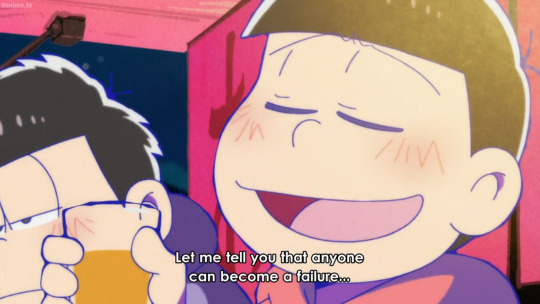
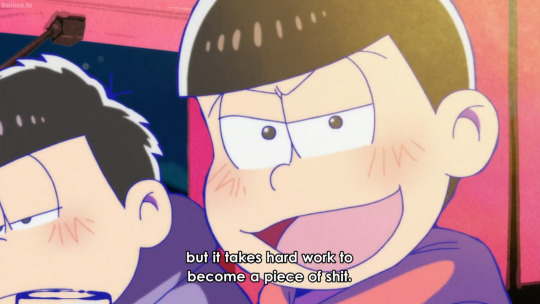
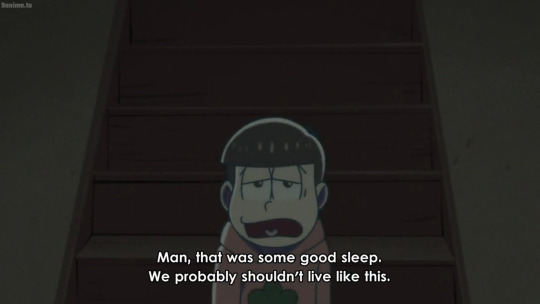
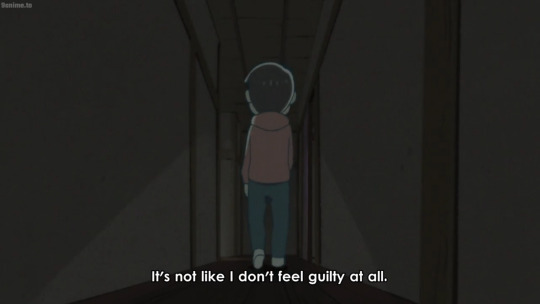
“Why is Osomatsu all my examples”, you might be asking. Well, he’s the damn blueprint for it all. The leader of the bunch, the first personality to grab your attention, has had all his issues projected and ricocheted in their echo chamber.
Ultimately, my point here is that you could think their “canon characterizations” (though canon means nothing in a show like this) as being intertwined with the nature of their self-aware existence. They’ve shown you all their tricks, the smoke and mirrors are getting boring, and they’re stalling long enough the story seems to be moving on without them - in spite of them. And when something genuinely threatens their way of life, they don’t know how to respond.
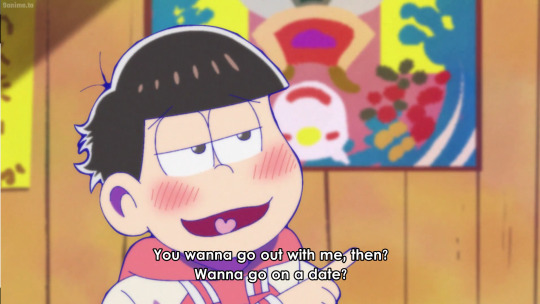
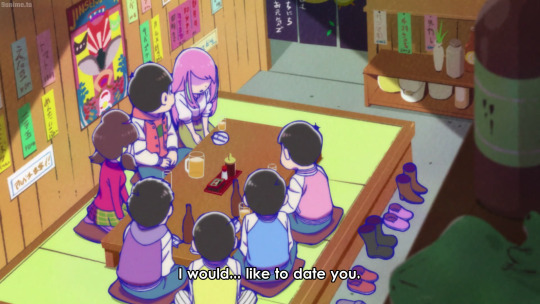
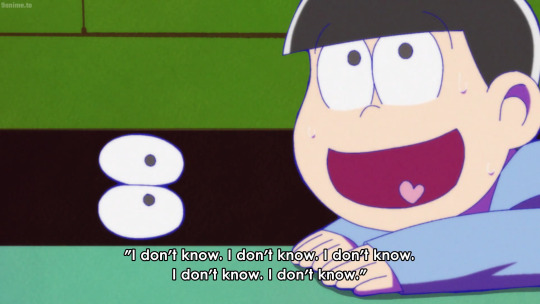
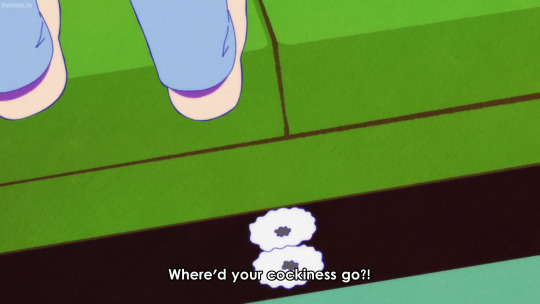
You can play it all straight, of course. Remove the meta jokes and all the same plot points can be hit, but, as a slapstick comedy, it’s able to easily add this additional layer in that I appreciate. I’ve said it in my last post and I’ll probably say it in more, but with comedy comes sincerity - the caveat of all the cartoon violence is that, on some level somewhere, this is how they really feel.
#osomatsu san#osomatsu#karamatsu#choromatsu#ichimatsu#jyushimatsu#todomatsu#osomatsu matsuno#karamatsu matsuno#choromatsu matsuno#ichimatsu matsuno#jyushimatsu matsuno#todomatsu matsuno#analysis#confession this was sparked by a convo i had w friends about s3e18#this is a bit truncated but i couldnt bring myself to make this longer#maybe ill make a pt2 or whatever idk
114 notes
·
View notes
Text
finished dear m a few days ago and i am sTILL thinking about it omg
genuinely was not expecting to be this invested in it because plot-wise it’s not exceptionally groundbreaking and i saw a few spoliers anyway in it but the execution of all of it??? just wow. spoilers below the cut!
pros/ what i liked:
i’m seeing so many people talk about jaehyun’s kiss scenes (which were great btw) but the karaoke scene?? my gosh the choKEHOLD it has over me it’s my favourite and mst memorable moment by a long, long shot. the song choice, their voices, the paralleled montages, that effortless formal ambiguity of diegetic/non-diegetic sound -- the film student in me is screaming into the void because of it.
but on that note, i, an nctzen, love to see jaehyun, hearthrob of nct, be a complete and utter loser. i simply live to see it.
ensemble dramas have a special place in my heart and i felt like i had enough time to get familiar with every one on the main cast, as well as their rationales and backstories (to varying degrees, obviously). were some behaviours toxic? definitely, but they didn’t feel ridiculous or ooc because the perspectives involved took the time to delve into the events and logic that eventually built up to the eventual result (this broadly applies to jimin/haneul/rosa/yidam interactions, mainly because upon writing this i realise that everything that occurred between jooah and moon joon was told through jooah’s perspective, which is why i feel so much more frustrated at moon joon on the romance side of things)
the first 6 eps had some exceptional moments where the cinematography really popped off and the intended meanigns were so obvious and so beautifully done. most of those i remember off the top of my head were from the first 6 eps but there likely were moments in the later 6 eps that i could go on about for ages.
what i didn’t like: maybe it’s because it’s only 12 eps long, but i do wish they pushed some of the narrative details further in the overall story.
i love the minho/moon joon & jooah/yanghee rich kid poor kid parallel and in the moments where it mattered they made it crystal clear, but i would have loved to see a moment where it was a jooah + minho vs moon joon + yanghee sort of situation on that theme, especially considering the fact that moon joon and yanghee are supposed to be friends but rarely had direct interactions with each other LMAO.
another one that i wish they fleshed out more would be rosa’s thing with that senior in their major like i wanna know the dirt he’s got on her to be able to threaten her like that. would it have changed my opinion that she was terrible for everything she did in attempts to either win haneul over or trash jimin? no. could it have potentially provided further justification, or at the very least further complexity to her character? i like to think so.
i didn’t watch the og webseries dear m is a spinoff of, but i think the connection between the fact that haneul lost his father and the traumatic effects that has on him, especially regarding how this could affect his relationship with jimin, could be explored. potentially because the effects of losing parents was reflected so well in minho, minju’s, and (to a lesser extent but still) jooah’s actions ie the way minho works his ass off to save money to give his sister, minju needing to be minho’s parental figure when she was still very young, the codependent but prideful attitudes they have towards each other, minho’s decision to stick by jooah -- platonically and later romantically -- because of the longevity and/or history of their relationship in deferrence of ridding her from his life (choosing jooah over past and prospective girlfriends every. single. time.), etc., haneul’s loss of his dad seems like such a throwaway detail in comparison.
might give it a proper rewatch and add on some later thoughts, but please i need to let this all out of my system before i can even think of moving on.
4 notes
·
View notes
Text
The DC Identity-Swap AU: A World/Storybuilding Fanfic Project (that needs a better name)
What follows is what has been come up with for a DC Universe where many heroes and villains ended up with different identities, initially conceived of by comradepitrovsky and expanded on by me and others.
In some cases, the said heroes ended up with different supporting cast members, in others not.
Let us begin, with the founding members of the Justice League:
-Superwoman: Diana Kent, the Last Daughter of Paradise. For…reasons, Themyiskara had to go to another dimension, but baby Diana couldn’t come, so at Hippolyta’s request, the Olympians sent her to a Patriarch’s World couple who would raise her right, namely Jonathan and Martha. She’s dating Lois Lane and her archenemy is Lex Luthor, with whom, I want to be clear, there is ZERO Foe Yay, because she’s disgusted by him, and he’s intimidated by her.
-Green Lantern: Kal-El of Krypton, who the Guardians appointed to lead the Corps through the transition to running itself. Came to Earth because he needed a break, stuck around because sweet RAO this planet needs help. He managed to keep Sinestro from going off the deep end, so he’s part of the Council Kal set-up to help him run the Corps, along with Kilowog, Mogo, Abin Sure and…not sure.
-Zatara: Bruce Wayne. After his parent’s deaths, Bruce was adopted by their close friend John Zatara, who realized the kid was tied to the demon Barbatos, and they figgered out a way for him to use that power for good.
-Captain Marvel: Barry Allen, while studying Forensic Science in college, took some classes, and became friends, with Archeology Student C. C. Batson (there is considerable overlap between the two fields, right?). When Batson and his wife were murdered during a dig in Egypt, Barry offered to help with the investigation, and ended up becoming SHAZAM’s champion.
-The Flash: Hal Jordan, test pilot for Ferris Aircraft, was struck by lightning whilst flying their latest prototype, and ended up tied to the Speed Force. (Note, like Johnny and Jessie Quick, can fly)
-Hawkman and Hawkgirl: Arthur Curry and Dinah Lance. The former encountered the wreck of a Thanagarian spaceship whilst exploring underwater and ended up with the soul of Prince Khufu. Dinah was hanging around her Uncle Carter's place and had something similar happen with the soul of Chay-Ara.
-Martian Manhunter. J'onn is exactly the same.
Other thoughts, somewhat random, in no particular order:
-Ollie was zeta beam'd from The Island to Rann instead of Adam Strange.
-Adam is instead Metamorpho.
-Eel managed to drag himself to Slaughter Swamp before succumbing to his wounds and so ended up becoming Swamp Thing.
-Owing to…complicated feelings WRT to her adopted brother, Zatanna ended up hanging around with her dad’s colleague Thaddeus Brown, and took up his mantle instead, becoming Madame Miracle, Magical Escape Artist!
-T. O. Morrow built Red Torpedo first, she got possessed by a water elemental somehow, rebelled against his programming, and ended up traveling to Atlantis, overthrew the tyrant Orm, was acclaimed Queen, married Mera, and now fights crime on the surface as Aquawoman. (I’m gonna say she sometimes wears a human disguise that looks Aquawoman-11, because I fancy her and will use almost any excuse to get her into one of these things)
-Ray Palmer and Ralph Dibny became Firestorm.
-Instead of becoming Cheetah, Barbara-Ann seized the power of Teth-Adam and became Captain Marvel’s archenemy.
-Pam became the Cheetah instead, and is an enemy of The Flash, with no small amount of Foe Yay.
-In addition to that, Hal is also in a Love Triangle with Carol and Lady Blackhawk, who came to work for Ferris after arriving in the 21st Century due to time travel shenanigans. Arguably a Love Quadrangle, since he's competing with his alter ego.
-Selina and Helena are both Star Sapphires and both of them are pursuing Kal-El, who is receptive to both.
-Barry is still with Linda, Wally is Capt. Marvel, Jr.
-The Batson Twins became Superboy and Supergirl, but I haven't come up with specifics. Help please?
-Bruce adopted Raven and Garth. Suggestions for codenames?
-In an effort to gain the power to defeat Superwoman, Lex made a deal with Ares, confident that he could handle the God of War. He is now possessed by Ares, but has no idea, assuming that the ideas Ares puts in his head are entirely his own, because he’s too arrogant to believe anyone else can control or manipulate him. It helps that Ares largely approves of Lex’s ideas and doesn’t need to do much. As a side-eeffect, Lex’s power armor has a distinctly Ares-y feel to it.
-Klarion is in Bruce’s Rogue’s Gallery. Said Rogue's Gallery also includes the Sivana family. Which means that yes, Bruce is dating Beautia.
-Bruce's archnemesis is the man who in the normal reality became Black Manta, who I've always headcanoned as choosing to torment Arthur purely by random chance, and obviously picked differently here. Since there's no need for a nautical theme, he uses a different codename; Black Bat.
-The first thing Kal-El did after completing training was rescue Kandor. Brainiac swore vengeance, and upon escaping from the Sciencells, discovered how to harness the Yellow Light of Fear. In addition to using it himself, he also unleashed a number of Phantom Zone criminals, took over their minds, and equipped his enslaved army with Yellow Rings.
-The Olympians left Diana some magic thingummy that allowed her to be trained in Amazon combat techniques, etc. in her dreams or something, because she needs something to make up for the lack of super-senses, but if she has the Lasso, I'm not sure how Lex can be a problem for her?
-Dick was adopted by the Dibnys, got himself the Gingold Extract, and fights crime as Firestorm’s sidekick, Elastic Lad.
-Mister Mind is one of Diana’s Rogues.
-Dr. Psycho is in Hal's Rogue's Gallery. Presumably, wossname the guy who framed him so he could steal his fiancee Mavra didn't do quite as good a job gaslighting her, she found out the truth, and he murdered her to cover it up. He is therefore unable to blame her for the plot in a feeble and cowardly attempt to save himself when Psycho comes after him. This leads to misogyny being a less prominent aspect of Psycho's particular psychosis, with his primary targets instead being "Alpha Male"-types like the man who ruined his life. And hey, here's Hal Jordan....
-Gen. Eiling as Reverse-Flash, Y/N?
-Thawne become Sabbac, Y/N?
-I think I'm gonna say Pam still has her canon powerset in addition to being the Cheetah.
-Since one of the best things about Hal is how he hates being told what to do, but is most comfortable in jobs where he's in a disciplined hierarchy...Zinda recruits him to create a new version of the Blackhawks. Not sure who else is in it; I can think of a bunch of ace pilots in the DCu, but they’re all American, and the Blackhawks should be an international operation. Possibility; the same temporal shenaniganry that dropped Zinda in the modern-day also spat-out Hans Von Hammer, the Enemy Ace.
-I'm adding Captain Nazi to Hal's Rogue's Gallery. Since Hal is Ambiguously Jewish, his sidekick is Inuit, and in this 'verse he's part of a team that's a legacy of an group founded to fight the Nazis, I feel like it works. Also, Hal's other villains thus far are a bisexual woman, a dwarf, and a US Air Force General, people who are naturally inclined to have beef with him and vice versa.
-Abra-Kadabra being one of Bruce's villains, Y/N?
-Circe is one of Bruce’s Rogues and they have UST.
@videodromeda
24 notes
·
View notes
Text
About Rule 63 fanworks
I was asked yesterday to elaborate on my genderbend opinions, as a trans person, which I’m happy to do, and I’ve thought about it a bit today to make sure I’m not saying something off the cuff and not thought through. Still, this is a sensitive, complicated topic, and I’m open to discussion on it.
This also got long, so I’m putting it under a cut.
So, obviously I can’t speak for all trans people. No minority group is a monolith in our opinions and this is particularly the case for the transgender community because our experiences are so very diverse and individual.
I am very rarely hurt or offended by genderbends/genderswaps/rule 63 fanworks. I know people for whom this is not the case, and I believe the pain involved is very real. The thing is... living in this world is inherently kinda painful when you’re trans. This world’s not built for us. All kinds of random things can cause me pain throughout my day. Store mannequins. My own reflection. Lesbian poetry. Pictures of other trans people. When something triggers my dysphoria or feelings of alienation, I have to stop, acknowledge the feeling, and then consider whether the thing is, outside of hurting me, contributing to the ignorance of and hatred of people like me by its very existence.
I don’t think the basic act of asking, “What if this character who is a cis man, was a cis woman instead?” does that. I think if anything, it opens the door to then ask “what if he was a trans man? Or a trans woman? Or nonbinary?”
Asking “what if this story was about a cis woman” lets cis women talk about their experiences and see themselves in stories, something I think is valuable! and also can lead to stories exploring sexism and misogyny, things which affect all trans people too!
In the rest of this post I’m going to use the terms “rule 63″ and “genderswap” to refer to the act of creating a fanwork changing a cis/presumed cis man to a cis or not-specified-to-be-trans woman, because this is the vast majority of the work under that label, because most fictional heroes and iconic characters are cis men, and because people who create cis man->trans woman or cis woman->trans man content, in my experience, usually use terms like “trans headcanon” instead.
(A lot of rule 63 fanworks don’t explicitly specify that the now-female character is cis. We can presume that most artists aren’t even thinking about the possibility of the character being trans, but we can presume that for 99.99% of all art, anywhere. It’s not a unique evil of rule 63.)
The claims that rule 63 is inherently transphobic, rather than just something where it’s good to be extra careful to avoid transphobia, as far as I’ve seen, use two arguments: A) that making the character a cis woman is wasting an opportunity to make them a trans person, and this is transphobic, and B) that rule 63 fan art is gender essentialist and cissexist, because it ties gender to physical characteristics.
Argument A doesn’t hold up for me,
because couldn’t one then say that reimagining an abled white cis character as an abled white trans woman is racist and ableist? that reimagining them as an abled trans woman of color is ableist? No transformative reimagining can cover every identity. We say “write what you know” and talk about Own Voices, and that includes cis women who want to write about the experience they know.
It’s also not fair to tell trans people that we must always think about trans experiences, even in our fiction. A lot of the time we don’t want to have to write or think about dysphoria and discrimination and we want to live in the heads of cis characters or even just characters whose AGAB is not mentioned!
And it is also, imo, not a great idea to pressure people who may not be educated about trans experiences to write about trans characters just because they want to explore sexism or write about lesbians.
many, many trans people first begin exploring their gender identity through creating cis rule 63 content, because it’s ‘safer’ than directly engaging with trans content.
With argument B, I agree that a lot of rule 63 art looks like this

and this sucks. To me, though, it’s important that it’s not the genderswap aspect that makes it suck. Artists who do this are also designing original characters with sexist, gender essentialist designs. Artists who don’t draw sexist art in general, also don’t draw sexist rule 63.
(yes, I know She-Hulk is not a rule 63 of regular Hulk. But you guys know the kind of art I’m talking about.)
I’ve also noticed a genre of fanfic that’s like, “if these characters were girls, they’d be sensible and conflict avoidant and none of the plot would happen!” or “what if these violent, tragic male characters were Soft Lesbians who braided each others’ hair” and again, I assume these authors write canonical women the same way. The genderswap part isn’t the bad part, the sexism is.
Non-sexist rule 63 actually, in my opinion, fights gender essentialism and cissexism. When a character is exactly the same except for the ways a gender essentialist world has shaped and pressured them based on their AGAB, that’s a strong statement on the constructed nature of gender!
But the argument that making /any/ change is gender essentialist, is... I understand where it’s coming from. I am a trans person who presents androgynously and I am a hypervisible freak because of it. I would love to live in a society where visible gender markers weren’t a thing! Unfortunately, we don’t live in that society. We live in one where we are constantly under pressure to conform to one of two profiles. There are almost no gender non conforming male characters in popular media. And changing a gender conforming cis man into a gender conforming cis woman seems to me to be a neutral action at worst. Not to mention characters from historical canons, who would be under a ton of pressure to conform.
For physical body type characteristics... 65% of all speaking roles in Hollywood are cis and male. It’s harder to get statistics on other forms of media, but it’s undeniable that overall, most stories are told about cis men who do not have breasts or wide hips. Changing the story to be about a cis woman who has those features is introducing more diversity!
I typed “rule 63″ and “genderswap” into the tumblr search bar today, and I saw a lot of art of women with a variety of aesthetics and body shapes and characteristics, who looked like people I’d see out at the mall.
Again, I sure do wish we lived in a post gender society. But we don’t, and in our society, everyone, myself included, looks at a picture of a person and gender categorizes them based on appearance. It is not wrong for someone to draw “Geralt the Witcher as a hot butch woman” and give her some physical markers generally agreed upon to denote ‘butch woman’ rather than ‘gender conforming man’ to tell the viewer that that is what they have drawn. Just as it is not wrong to draw “my OC who is a hot butch woman who fights monsters” and give her those markers.
Finally, both arguments against genderswaps are, in my opinion, flawed because they implicitly posit the act of creating fanworks of the original, cis male gender conforming character design, as neutral. I think this is incorrect. I think that if you’re going to argue that drawing a cis male character as a cis woman is transphobic, you have to also argue that drawing the character as a cis man is transphobic. But I’ve only seen people do this when a trans headcanon becomes extremely popular in a fandom.
Again, I’m just one person. I’m also biased, because firstly, as I mentioned, rule 63 doesn’t usually trigger my dysphoria; secondly, I almost always come down on the side of “don’t limit what people can explore in fiction; ask them to explore it more sensitively or with more content warnings instead.”
I definitely encourage creators to seek out and listen to a variety of trans opinions. But this is mine: I love rule 63, I make a lot of it myself, and I think if no one created it we’d lose something awesome.
At the end of the day, what I really want is more trans content*, but I’d rather have cis rule 63 than just stories about cis men.
Also: I personally have nothing against the terms genderswap or genderbend. I don’t think it reinforces the gender binary to acknowledge its existence by saying you’re ‘swapping’ the character from being cis with one AGAB to being cis with the other. But I can definitely see the argument against it, so I don’t blame anyone for going with rule 63 instead.
If you made it this far, thanks for reading; I hope you have a nice day, and have fun creating and consuming the fanworks your heart desires. I’ll end by linking this comic, which is just eternally relevant.
(*by which I mean: trans content created by other trans people, that matches my hyperspecific headcanons, likes and dislikes, and doesn’t set off any of my often changing dysphoria triggers. See what I said at the start, about transgender existence being constantly mildly painful. There are many awesome aspects to being trans! This is one of the less awesome.)
61 notes
·
View notes
Text
Differences between The Old Guard film & Book 1 of the comics (and how I feel about the changes)
Long story short, I actually do prefer the film version of the story, as I think it makes for stronger character dynamics established upfront and for greater character growth and arcs throughout the story.
I’ll list the differences here and I will speak about how each of these changes I think affects the story we saw on film versus the one we got in the comics, and how these changes may play into character dynamics and arcs if a sequel film were to happen.
1. No Baklava tasting scene.
In the comics, the team meets up at some outside cafe to speak about meeting Copley and teases Andy a bit about her “hall of fame” of bed partners. In the film, we have the Baklava tasting scene when everyone meets up at the hotel. The big difference between these two scenarios is that in the comics, it is to set up the job, and to comment upon Andy’s rotating door of bed partners which we are shown over the opening narration. But the film forgoes to the more sexualized focus on Andy’s love life to explore and show visually the bond of these 4 immortals. Using the baklava tasting, we immediately establish the character personalities and dynamics of the team, making us more invested in this group and their bonds with each other - all without sexualizing Andy, in fact, there’s more than a few times in the comics where Andy’s love life gets randomly brought up, including Andy saying Nile’s brother is hot upon seeing his photo. The film thankfully decided to focus on the character dynamics instead.
2. In the comics, it’s Nicky and Andy who meet Copley instead of Booker and Andy. (also Booker and Andy’s dynamic)
This change in the film where we have Booker and Andy meeting Copley instead is a continuation of the film’s intention to highlight Booker and Andy’s close dynamic. In fact, it begins even earlier as the movie opens with Andy and Booker meeting up first and Andy giving Booker the first edition Don Quixote. And this continues throughout the film where Booker basically acts as Andy’s right hand man, and this dynamic remains even through Booker’s betrayal and in the ending scene where they part ways. The little change with a different character swap doesn’t seem very important until you see the whole film and realizes that a lot of hinges on selling the audience of Booker and Andy’s relationship and Booker’s love for the team. And this is where the film, aware of each character’s full arc, changes things around to make sure every scene in the film is used to push character arcs into the right resolution at the end.
3. Killbox scene - in comics, team is still standing on their feet.
I noted upon reading the comics that when the team gets shot by the soldiers in that killbox ambush, the team are still on their feet, and Andy verbally signals “it’s our turn” before attacking. In the film, our team actually falls and dies, the soldiers then turn away from the group as the team regenerates and between a few shared gazes, wordlessly get up and attack. This is another indication of the film’s intention to SHOW not TELL. Through the visual language the film uses, we immediately not only see that our team can fall and die and the healing takes time and is not pleasant, but also that they move as a unit without so much as a word. And just like that baklava scene in the beginning of the movie, it builds up the team’s relationship and speaks to their years together without having to dump any exposition.
4. No Andy and Nile fight scene on the plane. (also Andy and Nile’s dynamic)
Not only does Nile not have a fight scene with Andy, for pretty much the entire run of Book 1, Nile really does not exhibit much agency beyond just following along with everyone else. Sure she asks questions and such, but her relationship with Andy is not built up much, and Nile seems to only be there because she’s got nowhere else to go, she seems to just serve as a plot point that happens and less as a character. The film, on the other hand, carefully crafts an arc for Andy and Nile to go on, culminating in Andy and Nile sharing that scene where Andy expresses that she now knows why Nile appeared when Andy lost her immortality. We see their relationship grow and change throughout the film, we see Nile react to Andy and eventually teaching Andy about how to live again.
5. Nile does not meet Nicky and Joe before their kidnapping.
In the comics, Nile does not meet Nicky and Joe until the very end fight when they’re all escaping from Merrick’s place. Nile basically has no relationship with Nicky and Joe, barely even knows them, because when she comes to the safehouse with Andy, Nicky and Joe were already kidnapped. The film instead changes scenes around where Nile does return with Andy and meet the team, spends at least some time with them before Nicky and Joe get kidnapped. I tweeted to the director Gina Prince-Bythewood to ask her about the decision to have Nile meet Nicky and Joe before the attack on the safehouse, and she confirmed my belief that it was to establish a stronger family/team dynamic to the audience. After all, if your main cast of characters don’t even know each other’s names until literally the last act of the movie, it is very difficult to make the team/family dynamic believable. This change of having Nile knowing Nicky and Joe establishes Nile’s further relationship and attachment to the team, that they aren’t just two random strangers that she doesn’t even know. And it builds up this team of 5 so that when they do go on to escape from Merrick’s labs at the end, we are cheering for this team to kick ass together, rather than wondering why Nile would care to go rescue two strangers she’s never met.
6. Copley is not sympathetic.
Copley in the comics is not a sympathetic character. While he is not necessarily evil, there is no motivation of grief and loss that drives him to act the way he does. He basically bails on Merrick at the end out of self preservation. In the film, we know that Copley watched his wife die and that pushed him to wanting to create a cure to end suffering, his backstory mirrors Booker’s struggles, in turn creating sympathy for both characters. The fact that Copley in the film is still a decent person makes Booker betraying the team and working with Copley a more palatable and understandable choice, especially as Copley ends up helping Nile get to Merrick’s lab and even ends up serving as the team’s tech/eye-in-the-sky person. This change for Copley’s character serves as another aspect where the film took great care to focus on character motivations and arcs. Copley’s research at the end serves to give Andy a reason to keep fighting, thus helping Andy and the team complete their arcs where they started jaded and tired, but now ready to fight another day.
7. Booker shoots Andy and Nile in revelation of his betrayal.
In the comics, Nile is also there with Andy when Booker turns on them upon meeting up with Copley again. Booker shoots both of them and doesn’t really say much as Copley talks about why they’re doing this. Then Andy basically kills Booker, threatens Copley, and jumps out of a window with Nile and Booker. They get to a desert where Booker and Andy proceed to shoot each other again multiple times until Nile stops them and Booker tells them why he betrayed the team. This chain of events is obviously different in the film, and this difference sharply contrasts Booker and Andy’s relationship in the comics as opposed to what they are in the film. In the film, when Booker shoots Andy and she’s tied up, he keeps on trying to explain to her why he’s doing this, Andy’s reaction is pained and heartbroken, and Booker is too and later on panics when she won’t stop bleeding. When Merrick’s men arrive, he tries to get them to leave her alone and fights to get to her when they take them both. This change, along with Andy’s more touching reaction to finding Booker injured at the safehouse, paints a more deep and nuanced bond between the two of them. Instead of them just repeatedly yelling and shooting at each other, we actually get to see them talk, we see them being gentle and physically caring towards each other. This shows to an audience a relationship that feels deeper and more loving than the comics which seem almost colder in comparison. And this deep bond the film creates plays into both Andy and Booker’s character arcs at the end of the film upon their separation. Again, the film takes care to focus on character relationships, and allow those relationships to fully form and fully reach the resolution that befits the character arcs.
8. Merrick is far more despicable and murderous. (also his doctor character is toned down)
Merrick in the comics is literally psychotic. He not only stabs Joe once, but multiple times, and proceeds to do the same to Nicky. And he constantly talks about wanting to hurt them and takes pleasure in it. Merrick in the film is not only smaller in stature than his buff comics counterpart, he’s also less physically violent. Sure he stabbed Joe because he wanted to see the evidence himself and he’s hardly that caring about ethics, but he still seems like an otherwise normal if not just simply greedy CEO type, not psychotic serial murderer type. This difference in toning down the character ultimately I think serves the film better because as Copley is more sympathetic, having him work with someone who is clearly and obviously behaving like a murdering lunatic would be really hard to swallow. This toning down of characters also happens with the doctor. In the comics, Doctor Ivan is basically just stated to not care about ethics, while Doctor Kozak in the film does share a talk about ethics and morality with Nicky where she says she believes they can be used to save the world. Again, the film seems intent on giving every character an understandable motivation, even among the villains of the story, which grounds the film in a feeling of reality, because no one is so outlandishly just being an evil mustache twirling villain. This change also produces some possible loose ends for the film’s sequel, as while the comics version of the doctor is dead, the film version only got whacked on the head by Nile, not outright killed so she may pop back up again in the sequel.
9. Nile does not get her solo fight.
In the comics, because Nile escapes from Copley with Andy and Booker, she returns with them to go find Nicky and Joe at Merrick’s place in Dubai. So she is never actually on her own at all in the comics. As I spoke about before, Nile’s character in the comics just tagged along, never really getting to come into her own. There is really no arc for Nile, whereas the film did the opposite. Because the film lets her have an arc, and lets her making the decision to join the team be something she comes to terms with on her own choice, this agency affords Nile growth that the comics doesn’t give her. Her solo fight is the culmination of her coming into her own power and acceptance. Once again, the film is consistent on ensuring that the characters change and grow and have arcs. This character building makes Nile a much more interesting and complex character than one note. Nile also gets to kill Merrick while protecting Andy and mirroring the plane moment from earlier in the film, while in the comics, everyone kills Merrick together. That moment in the comics did not serve the narrative catharsis that Nile taking out Merrick did.
10. Andy is mortal.
In the comics, Andy starts immortal and jaded, and ends the story really not much changed at all. Other than defeating a villain, you really don’t get the feeling that she’s changed from the experience. There is no revelation of her purpose, she just kinda does what she has to do, even if that means threatening an old woman. Andy in the film clearly starts out feeling lost in her purpose, but gradually through Nile’s joining of the team and Booker’s betrayal and her own mortality, she starts to see what her purpose is and wanting to be alive again. The scene of Andy at the store with the employee who helps bandage her up doesn’t exist in the comics because Andy is not mortal, therefore there is no sudden questioning of why, of re-evaluating her feelings about humanity. But the film takes the time to make Andy confront this, forces Andy to not only face it but learn from it. This change not only gives the story more stakes, but also allows Andy to have a character arc that affords her growth and an answer to her opening narration. It also makes Nile more than a plot point and her joining the team be an important narrative that makes an important change.
11. We never see Joe and Nicky’s reaction to Booker’s betrayal.
In the comics, because Andy and Booker never gets captured, when the team meets back up together, Nicky and Joe has no idea of the betrayal. And we never see them find out because after they kill Merrick, the next scene is them exiling Booker. In the film however, we do see Joe reacting angrily to Booker, we once again get a look into their dynamic and Booker pointing out how Nicky and Joe always had each other, meanwhile Nicky is trying to calm Joe down to stop him from saying something that he might regret later. This change is a further way that this film builds upon the established character dynamics. We as the audience see their reactions, see their humanity, and see them behave as a family would when feeling betrayal. But also that Andy has changed from that jaded tired person into someone ready to fight again when she tells Booker that they’ve been doing a shitty job of living and he needs to get up and stop wallowing in his self pity and pain. This makes their separation hit harder at the end because there are real emotions on all sides. Like all families, feelings can be complicated but there is also care and love. At the end, we see Booker nod to Joe as they all leave, signaling that despite the anger and chasm between them right now, they are still family. The film once again reorients the story to focus on character relationship, on selling the audience this familial bond, because if we don’t believe in it, then Booker’s redemption falls apart, and the film in many ways falls apart.
12. Noriko and Lykon.
Now the obvious change here is casting. Noriko is Japanese in the comics and her film counterpart Quynh is played by a Vietnamese actress. And Lykon is white in the comics whereas in the film he is portrayed by a Black actor. In the comics, Noriko fell overboard during a storm. In the film, due to budget constraints, they went with her being dropped into the ocean locked in an iron maiden. In the comics, Lykon spent over 2000 years with Andy before he died during the Renaissance, meaning he would have met Nicky and Joe. In the film and the history clips that Netflix posted, Lykon died before Nicky and Joe were immortal. Obviously with Lykon, it ultimately does not affect the story either way since he is dead, it’s just clearly the film changed the years he spent with Andy to avoid any confusions and to make things a little more simple in streamlining the team’s history. But the change with Noriko/Quynh is a much bigger thing. Firstly, character motivation - it’s one thing to be lost during a storm and another thing to be purposefully locked into an iron coffin and left in the ocean to suffer. This difference could make the difference between how Noriko reacts to Andy and the team in the comics, and how Quynh will react to everyone in the film. Secondly, because of the way the film presents Andy and Booker’s bond and especially now with Andy’s mortality, which the comics does not have, this could spell a big divergence in what a sequel could do with Booker and Quynh’s interactions. Because Booker would still be guilty over Andy’s mortality, and he would be more reluctant to do anything that could hurt Andy and the team, leaving me to suspect that he is less likely to go towards a villain route in betraying the team again. Whatever Quynh may get him to do is likely going to be out of force/coercion, if Quynh’s intention is less than good.
---------------
So these are just some of the big differences that I feel like affects the story ultimately told in the comics and the film. I did enjoy Book 1 of the comic and I am planning to get Book 2 once the collection is out. But I think the film’s changes really made it a focus on enhancing the character relationships and allowing individual characters to have their own arcs of growth. The comic tells a great action fare. But the film’s changes effused more humanity into the characters in a way that I feel the comic lacked. The film also really make you question the issue of immortality and what it all means and how it effects people while the comic focused on more of the action adventure story with the immortality as more or less a tool than really a theme.
Ultimately, I think the changes in the film took what worked in the comics and really elevated the story.
#the old guard#andromache the scythian#nicolo di genova#yusuf al kaysani#sebastien le livre#nile freeman#james copley#steven merrick#the old guard spoilers
67 notes
·
View notes
Text
Dragon Quest III: The Seeds of Salvation review
The original Dragon Quest was an extremely important and influential game that built the foundations to the Japanese role playing game genre, but was an extremely basic game that would end up outclassed by nearly any other RPG on the NES released afterwards that wasn’t completely incompetent, and while Dragon Quest II improved upon the foundation of the original, namely in terms of party progression, it was also a rushed, unbalanced, overly difficult and overall tedious experience. Despite its importance, Dragon Quest’s third installment would have to be a significant step up, and as luck would have it, it was, becoming another of the most legendary and important RPGs ever made, and firmly cementing Dragon Quest as a series that would stay around even to the present day, and how exactly this came to be is what we’ll be looking at today. The version I played was the SNES remake with a fan made English patch, so many of the names in the screenshots won’t match up with official translations. Other options are the Game Boy Color version, which was officially released in English, and even has a bit more exclusive content, namely a very time consuming sidequest and a bonus dungeon related to it, the Ice Cave, and much more recently, the mobile/Switch version, which is also available in English, and is based on the SNES version, minus some of its exclusive content. Be warned, there will be spoilers.

Story:
In an unnamed land, geographically similar to the real world, the archfiend Baramos has appeared and unleashed monsters to plague the land, with its people’s woes ranging from groups of bandits robbing kings and kidnapping citizens, to monsters impersonating rulers, to entire towns being wiped out by the forces of Baramos, who ultimately plots to destroy the entire world. A hero from Aliahan, Ortega, once set out on a journey to slay the archfiend, only to fall in combat with a dragon over a volcano. The child of Ortega is thus given the task of slaying Baramos themselves on their 16th birthday, with the help of a group of adventurers recruited from Aliahan’s tavern.
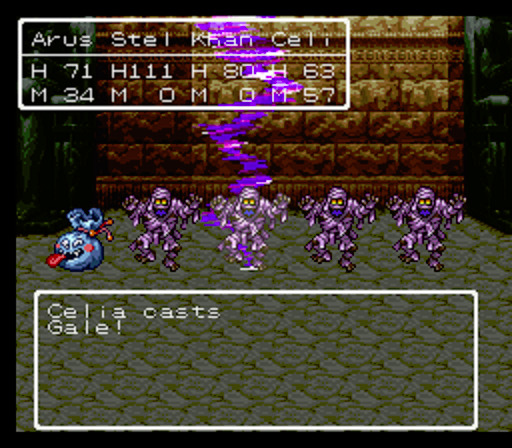
On the surface, it’s still not much more of a plot than the first two games, and for the most part, that is true, but it’s still much more interesting simply because there’s much more going on. Many of the towns you visit are facing some sort of crisis, or have some sort of interesting circumstances around them, such as the immigrant town that slowly changes and expands as the game goes on, making them a lot more fun to discover and explore compared to the towns of the first two games. Additionally, there’s the famous and influential late game twist that strikes after defeating Baramos, namely the reveal of Zoma, Baramos’ superior, and the second world map of Alefgard, the setting of the first Dragon Quest. These two twists are a large part of what made Dragon Quest III so impactful when it came out in 1988, and considering the game presents itself as unrelated to the previous games, and that by the time you defeat Baramos, you’ll have explored the entire world, barring two small locations at most, they hold up fairly well even today. There’s not much more for me to add besides this, however, so it’s time to hop straight to the gameplay.
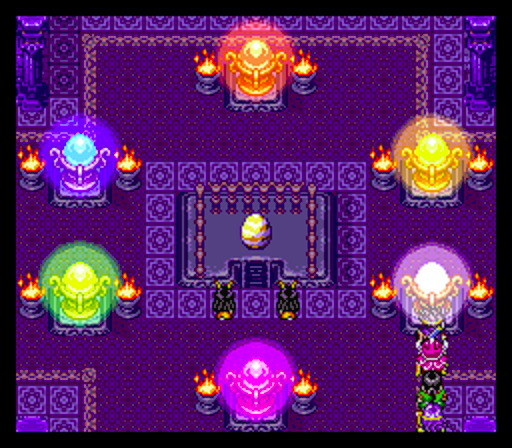
Gameplay:
Dragon Quest III uses the same turn based battle system as the first two games, and besides things like new types of spells and weapons, not too much is changed with the combat itself. The biggest change DQ3 provides is to the party progression system. Instead of the Hero being completely alone like the first game, or gaining two fixed party members in the second, DQ3 allows you to build a party from the ground up, besides the Hero, who’s always required to be in the party, and has the exclusive Hero class, with well balanced stats and unique and useful spells. The party size has been increased to four at a time, and party members can be created and exchanged in Aliahan, with a total of 8 different classes they can be: warriors, slow, yet well equipped physical fighters that act has tanks and heavy hitters, priests, who specialize in healing and support spells and, contrary to most healers in RPGs, actually have decent equipment and offensive options, mages, typical magic attackers with great offensive spells, yet bad physical stats, martial artists, physical attackers with great agility who forgo most equipment and have a higher chance of landing critical hits, merchants, average at best fighters who have supporting abilities like being able to earn extra gold after battle, gadabouts, odd and clownish characters with bad stats besides luck, and a fixed chance to simply goof off and take random actions instead of doing as commanded, thieves, a class exclusive to the remakes, with great agility and several abilities that mainly help with exploration, and sages, who learn nearly every spell in the game, and have a wide selection of equipment options, yet cannot be put in the party to start.

Compared to Final Fantasy I, which had a similar class based party system, and came out only a few months before DQ3, this system actually has quite a few advancements. Most importantly, you’re never simply stuck with the party you start with. As long as you can make it to Aliahan, you can simply make new characters and swap out whoever you’re currently using. Obviously, doing this too much isn’t very practical, considering new members will be behind on EXP, but not being able to permanently lock yourself into an awful party combination is a big improvement alone. Party members who have reached level 20 can also change classes at Alltrades Abbey, resetting their level to 1, and cutting their stats in half, but keeping any learned abilities, meaning, if you were so inclined, you could make a mage with the physical stats of a warrior, a warrior with the speed of a thief, and so forth. Changing classes like this is also the only way to get sages into the party, and even then, only with the use of a Words of Wisdom book, of which only two exist in the game. This lends itself to a lot of creativity, and while I personally didn’t use this mechanic much, only turning my priest into a sage, it’s still an impressive level of complexity for a game this old.
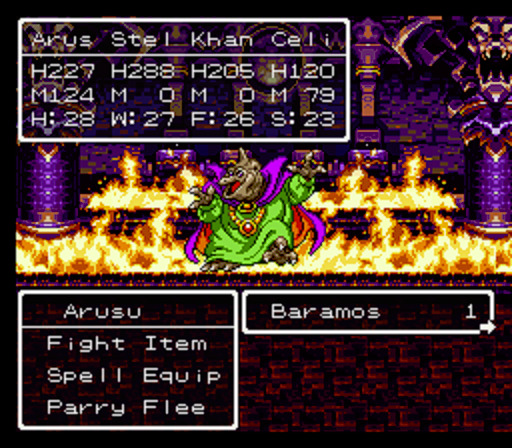
The class balance is also fairly interesting, as beyond the upsides and downsides already listed, classes also level at different rates. Warriors are expensive to equip and very slow, but level the fastest out of the main offensive classes. Martial artists are, by contrast, very cheap, but have the third slowest leveling rate in the game, and the little equipment they do have is usually pretty difficult to get, especially their weapons. Merchants are guaranteed to eventually fall behind if you try to use them, but actually have quite a bit of exclusive, and good, equipment early on, and level the fastest out of everyone. Gadabouts are liabilities, but level second fastest, and can become sages for free once they reach level 20, making them an investment class. Despite how several classes are very obviously inferior in the long run, you actually can get away with some pretty unorthodox party combinations, at least earlier on. Take my party of hero, warrior, martial artist, and priest: very strong physically, but expensive to upkeep, despite the martial artist somewhat balancing it out, and lacking in offensive magic. While switching the priest to sage later on mostly fixed the latter issue, I was still left wishing I had taken a mage with me from the start several times, and yet I was still more than capable of finishing the game. While the difficulty has definitely been lowered compared to the first two games, that’s still a sign of ultimately successful balancing.

For some more combat related changes and improvements, some stats have been added or changed since the first two games. Resilience now determines how many hit points a character can gain when leveling up along with being added to physical defense as before, Wisdom determines a character’s potential magic points, as well as how soon they learn spells, with spells being delayed or expedited by up to three levels, and Luck determines how well a character can avoid debuffs and status ailments inflicted by monsters. Related to these stats, exclusive to the remakes is the personality system, which affects the stat growth of each character, with each party member gaining a personality during character creation or, in the case of the Hero, through a personality quiz given at the start of the game. While this generally doesn’t matter too much for casual play, assuming you aren’t unlucky enough to get the worst personalities on all your party members, it still adds an even greater deal of complexity, either allowing you to try to compensate for a character’s weaknesses, or add to their strengths. You could, for example, give a female warrior the Amazon personality, raising their strength growth, but lowering their agility, wisdom, and luck growth, stats they don’t care about much anyway. You can also change personalities during the course of the game, either temporarily by equipping certain accessories, or permanently by reading certain books scattered throughout the game, which further adds to the depth. It’s a bit overwhelming, but still pretty interesting to see.

Beyond the combat and classes, there’s still a lot of nice things to see. The bag from DQ6, which can hold an unlimited amount of items which can be taken out at any time, has been added, allowing easy inventory management on the spot. The Zoom spell now lets you return to towns of your choice, rather than the last place you saved your game, and while not every town can be warped to, it’s still a massive time saver. There’s a day night cycle, which gradually changes when traversing the world map and affects the state of the towns, and while it isn’t super prominent, there are a few towns pretty heavily affected by it, and you actually get a few ways to manipulate it later on. There’s also a few minigames added, once again exclusive to the remakes, those being the monster arena, where you can bet on computer controlled monster fights for the chance of winning money, and Treasures n' Trapdoors, which is basically a giant board game one of your party members can traverse, with several very valuable prizes available, both from winning and from landing on certain spots on the boards. Despite being very luck based, it’s creative and rewarding enough that the boards are actually a lot of fun to play, and the Switch version lacking this minigame entirely is a big shame. The remakes also added the Cloudsgate Citadel, a bonus dungeon accessible after defeating the final boss, with a superboss, Xenlon, waiting at the end. Defeating Xenlon within a certain number of turns allows you one wish, such as opening up a new Treasures n’ Trapdoors track, or resurrecting a certain character, and thankfully, you don’t actually need to traverse the entire dungeon again to refight Xenlon for more wishes, as a Zoom location is added only a few rooms away.
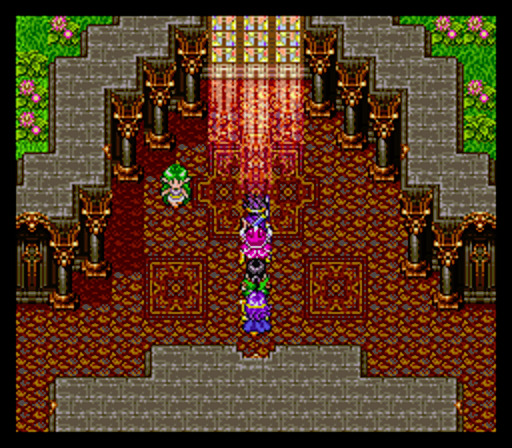
The biggest improvement DQ3 makes, however, is just how well the game flows. There’s still grinding to be found, yes, but generally, the game goes by much faster. Characters move quickly, the difficulty, as mentioned before, is much lowered, so you don’t need to grind 5 levels just to walk a bit north, and there’s just a lot of variety that keeps the game fresh all the way through, instead of becoming monotonous like DQ2. The dungeons are also much more reasonably designed compared to the giant, nightmarish mazes of DQ2, and while you do get a ship like in DQ2, it comes quite a bit later, keeping the amount of areas now available to explore from being as overwhelming. The obligatory key item fetch quest, this time collecting the six orbs to hatch the phoenix Ramia, is also much more reasonable to complete, with the orbs either being in locations that NPCs directly talk about, or being acquired by fighting bosses. Speaking of which, there’s also many more bosses than in previous games, and while they’re not as frequent as in most RPGs, they still add a nice bit of variety, along with actually being pretty challenging, in a good way. Overall, Dragon Quest III’s gameplay actually holds up very well, and just makes it a lot of fun to play. Even considering this is a remake with a lot of quality of life improvements, I was amazed that this was originally an NES game.
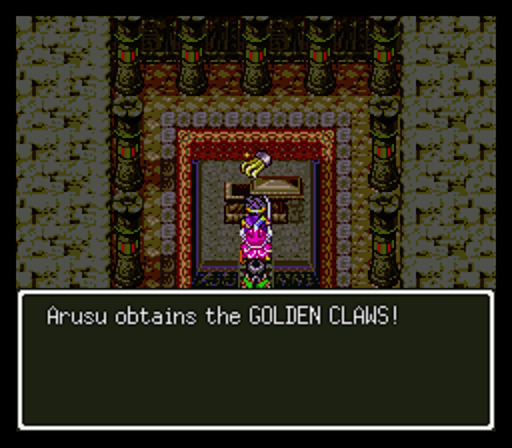
Graphics:
DQ3′s visuals are quite nice, as the SNES version was made with DQ6′s engine. To give a comparison, whereas the games using DQ5′s engine were about comparable to the visuals of Final Fantasy IV and V, the visuals here are comparable to Final Fantasy VI, and considering that’s one of the best looking SNES games out there, that’s a pretty big leap. The character designs come out quite well, and many locations have unique looks to them, both towns and dungeons, with the Pyramid and Baramos’ ghastly castle sticking out the most to me. The enemy battle sprites are still great, and are actually animated whenever they attack, adding a lot of life to them.
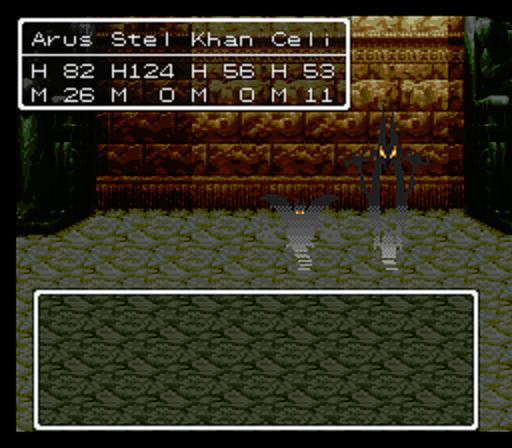
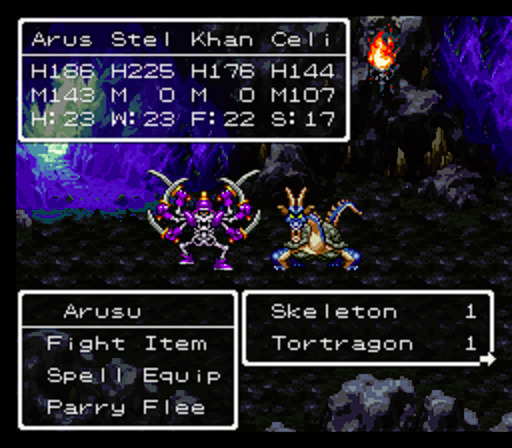
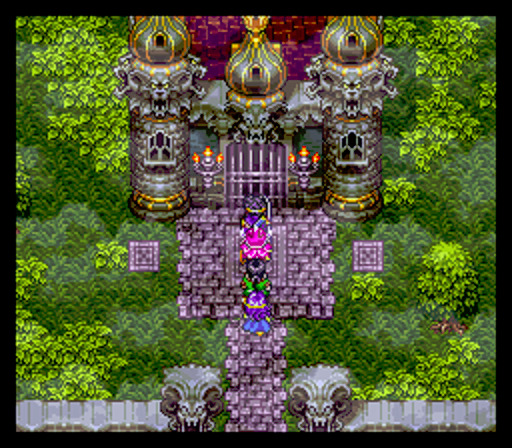
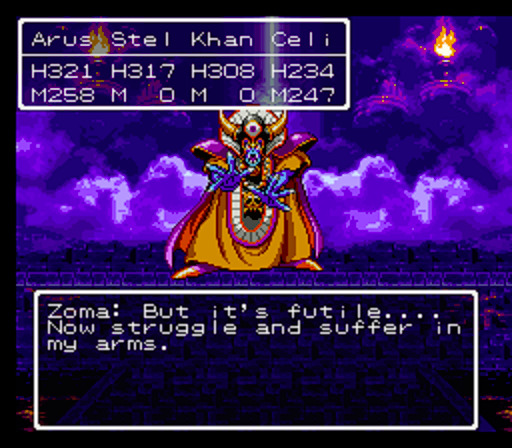
Sound:
As with the rest of the series, DQ3′s soundtrack was done by Koichi Sugiyama, and it’s once again a great soundtrack, even better than the soundtracks of the previous games. From the peaceful Small Shrine, to the iconic Overture, to the peaceful Heavenly Flight, to the world map theme Adventure, to the great final boss theme, Hero’s Challenge, it’s a soundtrack that’s a joy to listen to. It also gives towns different themes for both day and night, which is one of my favorite things to see in games.
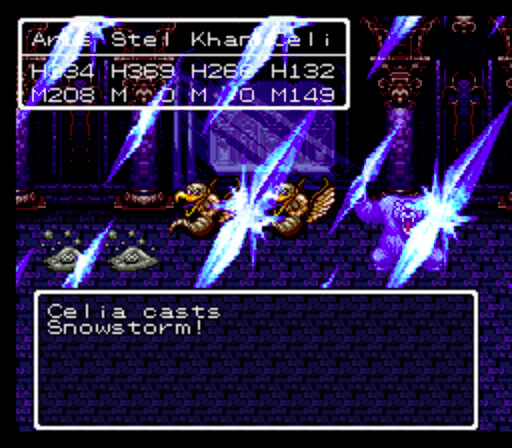
Conclusion:
Overall, I would give Dragon Quest III a recommended. It’s aged very, very well, and genuinely feels like it could have been on the SNES to start. Between the much deeper, yet ultimately accessible mechanics that give quite a bit of replay value, to much better overall design gameplay, graphical, and sound design, it makes a fantastic entry point for the series, if you have a liking for classic RPGs. Till next time.
-Scout
5 notes
·
View notes
Text
Runeterra Retcons 8: Kog’Maw
I’ll be honest: when people consider Champions that could use a lore rewrite or update, Kog’Maw is probably far from the top of the list. Frankly, I wouldn’t be surprised if this was Riot’s thought process as well. Kog’Maw is another case similar to Twitch where his current story isn’t bad per se, but more-so that there isn’t really much there. His bio on universe consists of only two paragraphs, which obviously leaves him feeling a bit neglected compared to other Champions post-reboot…
Except it kind of doesn’t? While significantly shorter than most Champions’ bios, Kog’Maw’s actually more-or-less does what it needs to. See, Kog’Maw is a Voidborn, a monster born from the eldritch realm of all-consuming cosmic horrors who want nothing more than to see Runeterra and all of reality assimilated and wiped out. While champions from the Void have been shown to have capacity for intelligence, they’re all really just monsters at the end of the day with their only driving force being to consume and grow. They enter Runeterra for that express purpose and that will continue to be their only driving motivation until they either die or until the world ends.
Now, every Voidborn is slightly unique in the ways they go about consuming things. Cho’Gath eats stuff just to grow larger, whereas Kha’Zix eats to evolve, adapting the most useful traits and abilities of his prey. Vel’Koz absorbs the knowledge and information from what he disintegrates, while Rek’Sai eats primarily so that she can continue to multiple and spread her brood across Shurima. It is interesting how Riot made a bunch of monsters whose primary goal is literally just eating and gives each of them a unique twist on the act, and though Kog’Maw is little underwhelming in that department. To get what I mean, let’s take a look at his bio.
So Kog’Maw, similar to Vel’Koz, eats primarily to learn and satisfy his endless curiosity about the world. Kog’Maw is a little unique among the Voidborn in that he’s not malicious or apathetic, but rather possesses an almost childlike innocence that drives him to simply learn all he can. Unlike the others, it’s not clear if Kog’Maw really even understands the Void’s mission or purpose to destroy everything, making him arguably the most sympathetic Voidborn by far.
As things stand, Kog’Maw’s current bio says all it really needs to about his character… Well, all but one thing. Since his inception, Kog’Maw has always been somewhat special among the Voidborn, having a direct link of sorts to Malzahar. The only real change from his original bio is removing any mention of the Fields of Justice or the League itself, but the fact remains that Kog’Maw has always been driven to find Malzahar for some unexplained reason. He wasn’t directly summoned by the prophet like his Voidlings are, but rather, it seems like the Watchers sent Kog’Maw to Runeterra to find the prophet...
But that’s all we know. Seriously, even Kog’Maw’s bio literally says that it’s “anyone’s guess” what will happen when the two finally meet, which, knowing how League storylines rarely get to see a conclusion of any kind, will probably be never. What makes Kog’Maw so special? Why does he need to meet up with Malzahar? How does this acid-spitting Void dog pose more of a threat than the likes of Cho’Gath or Baron Nashor?
Today, that’s what I wanted to explore. I suppose you could say that this episode is less of rewrite or retcon, and more an expansion. I want to give Kog’Maw a more significant role in the story, and while we’re at it, continue the trend of giving him a unique reason to consume things that makes him stand out from the others. So, without further ado, let’s build upon the Mouth of the Abyss and finally give an answer to these age-old questions.
For eons, the Void has gnawed at the barrier between itself and reality, aiming to break through it to usher in the end of all things. The unfathomable horrors that rule over the Void have sent countless of their malformed spawn through cracks in the barrier to further their ambitions, and on occasion have even contracted humans desperate enough to become their heralds. The most prevalent of these heralds are the traitorous ice witch Lissandra and the Shuriman seer Malzahar, but none would ever suspect that the true key to oblivion is a lone Voidling simply known as Kog’Maw.
When Malzahar swore himself to the Void in the remnants of Icathia, the broken seer proved oddly compatible with the otherworldly powers of the Watchers. Just as the Void had called to him, the seer unknowingly called out to something in the depths of the Void. As Malzahar left Icathia behind him, a writhing, twisted creature emerged from the cracks in the earth. A strange, caustic substance secreted from this larva as it slowly took shape. Eventually, the creature formed a mouth and eyes, and found itself intrigued and perplexed with the strange new world around it.
For months, the Voidling wandered the wastes of Shurima alone, driven by a deep-rooted desire to find the one that had summoned him to this world. The more he wandered, the more he began to develop a taste for the unusual, fascinating creatures of Runeterra. Even as he sampled everything he could, however, the Voidling continued to search for the one who called for him. It wasn’t long before he encountered other humans, but they were of little help, offering screams rather than any means of finding the one who summoned him. In response, the Voidling simply melted and devoured those who proved otherwise unhelpful. Those who survived such encounters named the beast Kog’Maw: Mouth of the Abyss.
Having no luck with the caravans, Kog’Maw turned his attention to one of the strange human cities to resume his search. As expected, the humans all screamed and ran, but some, to his surprise, lashed out. Sharp objects pierced Kog’Maw’s flesh, leading to him retaliating with globs of acid that burned through the armor of his attackers. Despite the potency of his bile, though, Kog’Maw was outnumbered, and soon found himself surrounded by soldiers who all drove their sharp sticks into the Voidling’s hide.
In that moment, a violent explosion of energy burst forth from Kog’Maw’s body, consuming the soldiers and their weapons and leaving nothing behind. After that, everything was darkness.
Kog’Maw awoke hours later, alone in the desert once again. Though confused and hungrier than ever, Kog’Maw resumed his search with renewed resolve to find the one called Malzahar. He believes that the Void seer is the only one who can satisfy his curiosity and help Kog’Maw to understand the nature of the mysterious power that dwells within him. The more he consumes, the more this power grows… And all-the-while, Malzahar waits for the destined time when Kog’Maw will arrive before him, ready to unleash that power and tear open the veil of reality once and for all.
So, ominous, right? I admit, it’s still a little vague, but I’d like to think that the implications are clear enough without me flat-out saying it. Basically, in my rendition of the lore, Kog’Maw is a bomb.
One of Kog’Maw’s most notable but also most out-of-place abilities in-game is Icathian Surprise. This passive ability basically makes it so that Kog’Maw explodes when he dies, allowing him to deal True Damage to members of the enemy team. This ability is never brought up or referenced at all in the lore, and it’s certainly a strange ability to have for a creature who’s all about melting things down with acid.
So, crazy thought: what if we actually gave Icathian Surprise lore relevance? What if Kog’Maw’s ability to self-destruct is actually his main ability? He melts things down to eat them, and the more he eats, the more the power inside him grows and swells. When he’s killed, Kog’Maw unleashes that power in a violent explosion powerful enough to obliterate everything around him… And if he eats enough, that power could even become so strong as to blow open reality itself.
Yes, Kog’Maw is more than just an acid-spitting Void dog. In my interpretation of the lore, Kog’Maw is a doomsday weapon. His purpose for eating is to build up power, and when he’s consumed enough, Malzahar will bring him to Icathia. where the Void already has a foothold. There, the prophet slays Kog’Maw so that the resulting blast will widen the gap enough for the Void to begin its assault on Shurima once again. This is the prophet’s grand plan, and for now, all he has to do is let Kog’Maw wander and feast…
The one silver lining is that if Kog’Maw dies prematurely, all the power he’s already built up is released and he has to start over from scratch. This, I think, is a much more interesting direction to take the character and gives him a much deeper significance in the Void plot overall. I also really like the idea that, despite seeming like the weakest Void Champion in the game, Kog’Maw is arguably the most dangerous because of his true purpose. I suppose I’m just a sucker for the trope of relatively harmless-looking characters possessing terrifying hidden powers deep down.
But, that’s my take on it. What do you guys think? Does Kog’Maw work as a secret doomsday weapon for the Void, or do you prefer to keep him vague and more comedic? Leave your thoughts below, and I’ll see you all next time.
6 notes
·
View notes
Text
Superman & Lois - Ep. 102 “Heritage”
In which the Sad Dad vibes and teen angst continues!
Spoilers!
Lois gets the opening and closing narration this week! And generally has more to do, which is nice.
The fam has officially moved to Smallville, so the boys are gearing up to start school...or are they???
Well, Jon is. Jordan is told he has to stay home until he can get his nascent powers under control because they don’t want him to accidentally flash frying a classmate. Which he almost did. Last week.
Clark calls Jordan’s accidental heat vision an ‘ocular release of energy.’
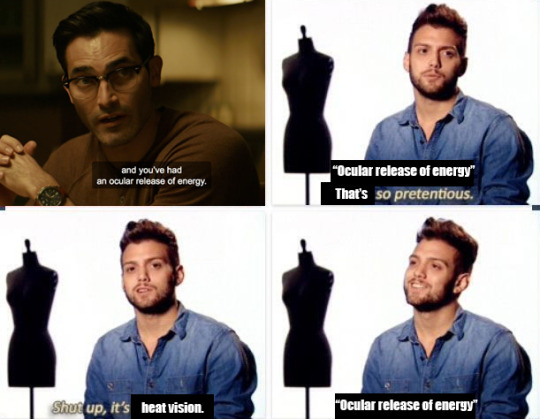
This decision, of course, leads to some FAMILY DRAMA. Jordan feels like a freak! Jonathan is upset that they’ve had to move! Clark feels like he’s failing as a parent!
Oh and also the guy in the Master Chief suit is on the hunt for Kryptonite. Which is, you know. Troubling.
SO it’s off to school for Jonathan and off to the Fortress for Jordan!
Lois, upon Jonathan asking why Jordan gets to go flying with dad: “At least we have the radio!”
One plus side about the show being ‘grounded’ and ‘prestige-y’: the high school drama is of a more believable variety. Still tedious, but at least it’s not dated 90s tropes.
...Well, okay. Not entirely true. Sarah Cushing’s personality thus far is ‘nice girl who’s dating a jerk’ and yes, the line “What do you see in that guy?” is said aloud. So.
Win some, lose some.
MEANWHILE, AT THE FORTRESS:
Love the actor they got for Jor-El. He’s perfect, in that he feels like an homage to Brando, Crowe, but is also his own distinct version. I dig it.
But there’s no giant key made of dwarf star matter because this is GROUNDED and REALISTIC and none of that SILLY CW NONSENSE, WE GOT HBO MAX MONEY.
Back to the Lois vs. Edge plot:
For all the folks wondering how Lois working at the Planet was going to continue, what with the show being set in Smallville...
WELL.
Edge now owns the Planet, so he re-writes a negative article she’s written about him, which leads to her quitting, and going to write for the Smallville Gazette.
Which is operated by Chrissy Beppo.
Who is...named after the super monkey?
Does this mean we’ll eventually meet other Smallville residents named after super pets? Like Marsha Whizzy, or maybe Kenneth Comet.
Seems a weird choice when ‘Bibbo’ is right there.
ANYWAYS.
Best line of the episode: “You know what babe? You do your Superman stuff, and I will do my Lois Lane stuff.”
MEANWHILE, THE SAD DAD VIBES INTENSIFY as Grandpa Jor-El reveals: Jordan...will never be like you, Kal-El. His human DNA is too limiting.
Which is a very interesting plot point (that was sorta mentioned/explored in Future State!)
So, about the boys: I still find them...mostly annoying. But I appreciate the dynamic they’re establishing: Jordan has always required more time and attention due to his anxiety disorder, and Jonathan has always had to look after him and compensate--this carries over into the new status quo where Jordan has the super powers and Jonathan further feels that his brother is getting time and attention and he needs to make sacrifices and changes for him/the family.
This leads to a really lovely moment between the brothers at the end of the episode that I genuinely enjoyed, so. I’m hoping that there will be more of that and less of ‘drama with Sarah’.
(Also if you think that sounds a little like another pair of Super siblings...it does! And also hold that thought.)
The OTHER big twist is that Master Chief AKA Captain Luthor comes from a world with an EVIL SUPERMAN.
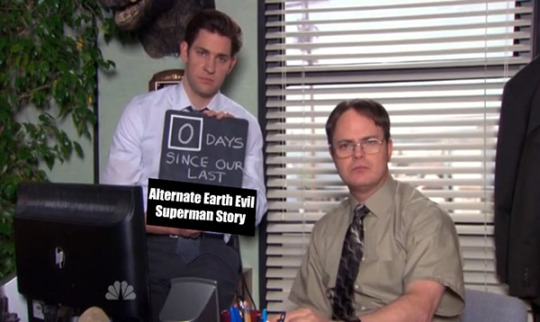
To be clear, the set-up is very obviously, ‘Our Clark will prove Captain Luthor wrong re: thinking he’ll turn evil,’ so I’m not seriously suggesting we’re in for a full-on Injustice situation. I just find it funny, how quickly they pulled out the ol’ evil Supes.
(The one we saw in Elseworlds doesn’t count since that wasn’t Clark.)
And maybe this one isn’t either! I admit complete ignorance as to the comics stuff they’re pulling from; I guess it’s somehow connected to Project 7734 (Which is ‘hell’ upside down, as any fifth grader with a calculator will tell you) a counter-Kryptonian force put together by Sam Lane, I think?
IDK. Like I said, comics blind spot.
The episode ends with Grandpa Lane looking a bit spooked at the ominous 7734 keychain Captain Luthor gave him, and Captain Luthor still on the hunt for Kryptonite! DUN DUN DUUNNNNNN.
And now, time for a segment I’ll call: Gettin’ Super Salty w/Stranger wherein I will stash all of my frustration regarding the fact that this spin-off doesn’t really want to be a spin-off.
Okay, so first up! As mentioned, the Fortress design has been changed because the silly Supergirl version does not vibe with the new serious aesthetic.
Their loss! More Legion Rings, baby Sun Eaters, and impractical front door keys for Supergirl!
The sunstone AI details the last days of Krypton, and only one (1) pod is shown escaping the destruction.
Thanks, I hate it.
I do appreciate that Jor-El at least kinda appears to be wearing clothes that match the look of Supergirl’s Krypton. I wasn’t paying close attention to the buildings in the hologram, no clue if they match the architecture we’ve seen thus far.
Like, I get it. There’s no time to pause the plot and be like, ‘hey, just FYI, I’m not the sole survivor of Krypton, my cousin escaped as well’ but also AAAARRRRRGHHHHHH.
You’re using the versions of the characters introduced in Supergirl, the least you can do is namedrop her once. ONCE. That’s all I’m asking. XD
They missed their opportunity, actually; when the boys were like, ‘We have so many questions!’ All you had to do was slip in, ‘Are we related to Supergirl?’ Bam. Done. Never need to go back to it, you’ve acknowledged it, continue on with your solo Sad Dad adventures!
(Except I guess that wouldn’t work, since so much of this is built on Clark being the Lone Protector of the earth. If you allude to other heroes being around, your whole character motivation/struggle makes less sense.)
I get it but I don’t have to like it. XD
They shoulda just set this on another Earth!
Circling back to the sibling dynamic: I hate how now I really want Kara to someday appear on this show and hang out with the boys and be like, ‘ah, yes, I know the feeling, my sister and I were the same.’
That’s it, that’s all the crossover content I need. I realize Melissa is moving on to bigger and better things but MAYBE SOMEDAY. XD (Or maybe I’ll just write a fic, who knows.)
I can’t remember if I brought this up already but it is hilarious to me that anyone still thinks of Superman as a reporter--most modern takes treat it as an afterthought and here, it’s dispensed in the first episode.
It has not been brought up since.
Like, much is made about Lois leaving Metropolis, and what that’ll mean for her career, but no one in Smallville is like, ‘Clark, wow! Farming? That’s quite a career change!’
(I assume he’ll be farming, since they mentioned starting the farm up again.)
...You think anyone will drag the writers for tossing aside Clark’s ‘true calling?’
Who am I kidding? Supergirl fandom is not watching this show, they’re just harassing the people running the social media accounts.
SO OVERALL: The good remains good! The meh remains meh! I appreciate that this version of Clark and Lois exist as we inch ever closer to the release of the Snyder Cut! But also the behind-the-scenes stuff continues to hang over everything like a terrible cloud! Here’s hoping those problems are addressed!
7 notes
·
View notes
Note
bella I would love a directors cut on literally any of the rilex you’ve written, but specifically it’s always her, and you, and me, or for these days you’ve been stuck in my brain 💙
OHHHHHH those are some CHOICESSSSSS lucy. fuck yeah. let’s get into it. ill link them both here but we’ll take em one at a time
it’s always her, and me, you
these days you’ve been stuck in my brain
here’s a cut for convenience cos i KNOW i’m gonna go long here.
okay! let’s start with the rilisex fic.
it’s always her, and me, and you
so like it says in the ao3 notes, this fic came from realizing just how frequently rian and alex kiss each other like, all the time? just? casually? for funsies? this was another one of those situations like i mentioned where the hook aka first line (“Rian's no expert, but he doesn't think normal friends kiss this much.”) just appeared in my head and i was like heyyy that’s a GOOD first line. i have to build from that line. that’s the hook, that’s the summary, that’s the core.
something i discovered upon searching through the editing history of the doc: i had originally sort of intended to go a direction with this where in some other circumstance, rian would see alex giving jack a super casual friendly kiss and he’d get all sad/jealous and be like sure why SHOULDNT alex kiss jack after all its just a thing he does with his FRIENDS. but the fic ended up going a different way and honestly? im glad. i like this way better.
the role of singin in the rain in this fic actually has a HILARIOUS backstory because the night i originally wrote that conversation in the tour bus kitchen, i went into the club and said the following

and then. the next day. rian streamed with ricky, and i asked if he’d ever seen singin in the rain, and he ANSWERED ME and said he hadn’t. so first of all i had already written the scene and i then had to rewrite it to make it so rian wouldn’t have seen it but also!!! i literally asked rian fucking dawson if he’d seen a movie for the sole reason of using that information for fanfiction!!!! and he provided me with the information i needed!!!! whole thing is just fucking hysterical to me. ANYWAY.
ANYWAY, the other reason why sitr has such a big role in the fic is because megs and i watched the movie together while i was in the middle of working on the fic, so it was extremely fresh in my mind. in fact i can probably show you this: i had this comment left for myself when i was kind of trying to figure out if i could make a real metaphor of sorts with the sitr ot3 and the Big Three of this fic. some of this ended up in rian’s wild musings in the hotel scene but i did conclude that it wouldn’t really have worked and that was definitely true but anyway. fuck it, director’s cut, here’s the kind of shit i leave for myself to refer to

so that’s part of the reason why it became such a puzzle piece of this fic, but real talk, it’s also just because i love singin in the rain it’s one of my favorite movies lmao
briefly gonna also touch on lisa and why she’s in this fic because i realize that rian/alex/lisa is an interesting approach to rilex! first of all, i love lisa. i love alex and lisa. and it occurred to me that there was really no reason to split lisex up just to make rilex happen. plus there’s this tweet that really just pushed me over the edge of being like yeah, rilisex is extremely plausible. so that’s that on that.

as for the scene in the hotel room while they’re watching sitr, there is a small piece of that scene - from when alex starts kissing rian’s shoulders etc to “it would defy the laws of nature not to” - that i actually wrote before anything else in that scene. that small piece got stretched out and edited quite a bit from how it started but it did function as a sort of foundation around which i built the rest of the scene, because that small section sort of ~came to me~ absolutely out of nowhere, and i really liked the Vibe it had and i wanted to include it. i THINK that was the only piece of this fic that i wrote Out Of Order - for the most part this was written chronologically.
ALSO!!! omg this is exciting, this fic actually has a deleted scene!!!!!! i hate cutting scenes but i also hate having scenes that are less than 1k and this one didn’t really contribute much to the fic. i can probably share it here right? sure why not ! hopefully you can read this. it originally took place after the scene where alex and rian call lisa for the first time. the question of “what gets left into interview videos and what gets cut” is also just interesting to me as a (fic) concept in general so...eyes emoji, but here’s my mini-exploration that i cut from the original fic. enjoy lol it’s silly <3
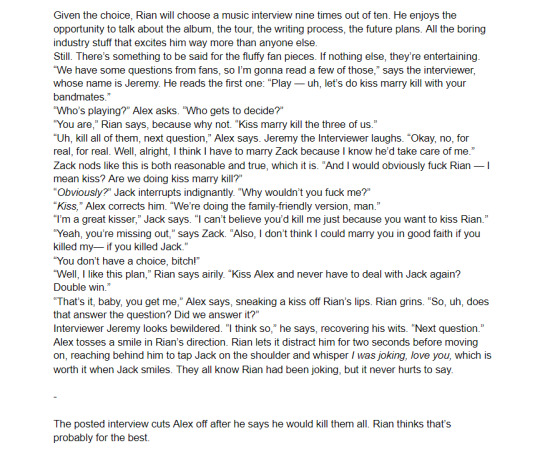
oh! also one more thing!! the very final scene was included for two reasons. the first reason being that when i write getting-together fics, i really prefer to add on a scene After they Get Together because i love to write domestic established relationship stuff and i think that’s a satisfying reward for a reader who’s just slogged through all the mutual pining and bullshit to get the characters together. but the OTHER reason is that i got an anon (here it is!) and i read that ask and was immediately like well shit. now i have to fucking include this. for the anon and for myself. so you can thank that anon for that last scene. (also i wanted to include merrikat especially since i had to cut their little moment in the interview scene above.)
so....................whew. i think i’ve bled that fic dry. holy shit that’s a lot of Stuff. OKAY! let’s move on.
~
these days you’ve been stuck in my brain
so!!! THIS fic was the breakthrough after (what felt like) a long bout of writer’s block. long for me was maybe two weeks, but i am the kind of person who is always writing, and two weeks was a long time to go with little to no inspiration/motivation to write anything. i had also been in a weird narrative headspace because i’d been binge-watching disney shows (jessie > austin and ally > girl meets world) and i don’t know how well i can explain this but the way those shows are written is a lot snappier and cares way less for realistic and consistent character development or plots or relationships, and so i was stuck between caring a lot about including those things in my fics but also being unable to conceptualize them in writing because my brain was in Disney Writing Mode. does that make sense? this is rhetorical so let’s go with yes. so anyway. i was in a slump
actually what i ended up doing was basically googling something like “au prompts tumblr” or something and just scrolling through posts. i saw something about soulmate telepathy and i actually tried to write something totally different before i wrote this one, but the first attempt was a different concept and then the direction i took it was like......it wasn’t quite right and i realized that i was kind of writing dark disney style? there is really no way for me to explain what i mean by that because it seems really obvious to me but that’s just because i’m inside my own head so just take my word.
anyway. attempt #1 of soulmate telepathy rilex went poorly, and this fic was attempt #2. i kinda took the soulmate telepathy thing and changed it as i saw fit and i also went back to skim helen’s telepathy fic because obviously she’s the pro and then i tried not to steal her ideas. and as i was writing it i kinda realized i was doing the whole quirky funny best friend character with jack and also doing the whole “somehow this not-very-dramatic situation with teenagers is treated as The Most Dramatic Thing Ever and that’s totally normal and nobody finds it strange” disney trope with rian and alex being soulmates and i was like (deep sigh) i have to accept that no matter how much i try to fight this, this fic is going to be tainted with disney. and that’s life
on top of that i will add that the real-life rilex were extremely inspiring during the two-day period during which i wrote this fic, because that was when the once in a lifetime video came out and in the brief pre-video livestream rilex were Beyond Married and that definitely helped in the writing of fic rilex!
hmmmm what can i tell you about this fic itself.................honestly, i don’t think there’s much to tell! rian is a band kid because in real life rian was a band kid and he’s staff manager at rita’s just like he was in real life. there is truthfully not a lot to unpack here that i can think of!
oh here’s something i guess: rian and alex go on a date in this fic! that is because watching So Much Disney made me realize that i often forget the fact that people just. go on dates. sometimes. look i clearly do not have an active romantic life but i also really liked the idea of alex and rian going on a date despite not knowing if they’d be soulmates or not and liking each other organically just by getting to know each other, rather than being victim to the whole soulmate thing. like i wanted them to build a connection so that they would want to be soulmates. and then the audience would want that for them too. stakes!! very important.
i can tell you i had a mild crisis over the title of the fic because i am not a fan of the word brain and i didnt wanna use that sticky lyric for the title when it had a word i hated but it was objectively a much better title option than the other one i had, which was “sticky just like the song in my head” but i obviously decided on the former and it has not upset me nearly as much as i expected it to so that was the right decision imo
so! i think that’s all on that! sorry (?) that it got so long although then again i don’t know what’s to be expected in a director’s cut for two long fics but thank you for asking me about these, i love them both so very much rilex is so supremely underrated but so very important
#cashtonasfuck#ask#answered#this is a whole ass multimedia fucking presentation#you asked for the director's cut but like i sure as hell didnt hold back dflkhggj#in fairness you picked two longer fics#though most of my rilex fics are longer ones which is strange#but like good for them#director's cut#this was really fun#thank you lucyyy <3#these were the good right choices for rilex fics to dissect because the other ones are either shorter or rilex is a background pairing#or like . just aint that deep#i stole the plot of something unpredictable from that other fic by that other person#so ya know#the fact that this response contains an entire deleted scene in a screenshot#this is a lot lmfao
3 notes
·
View notes